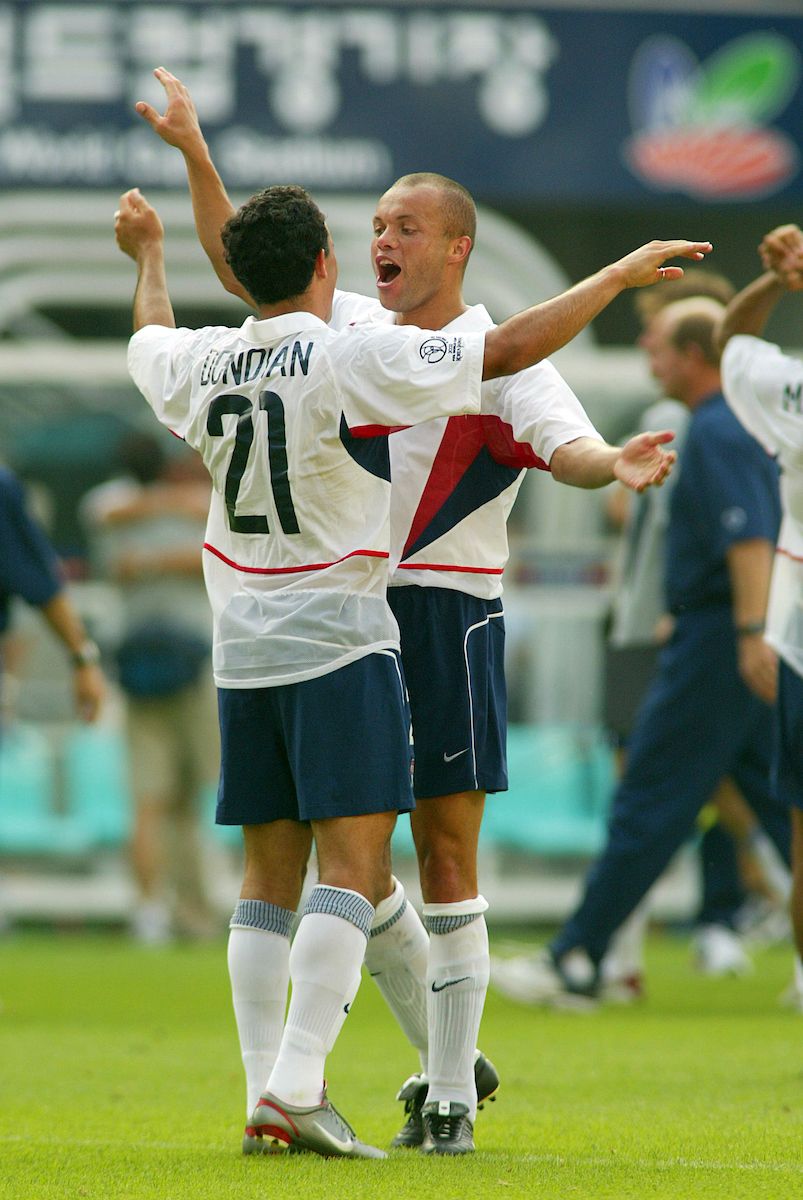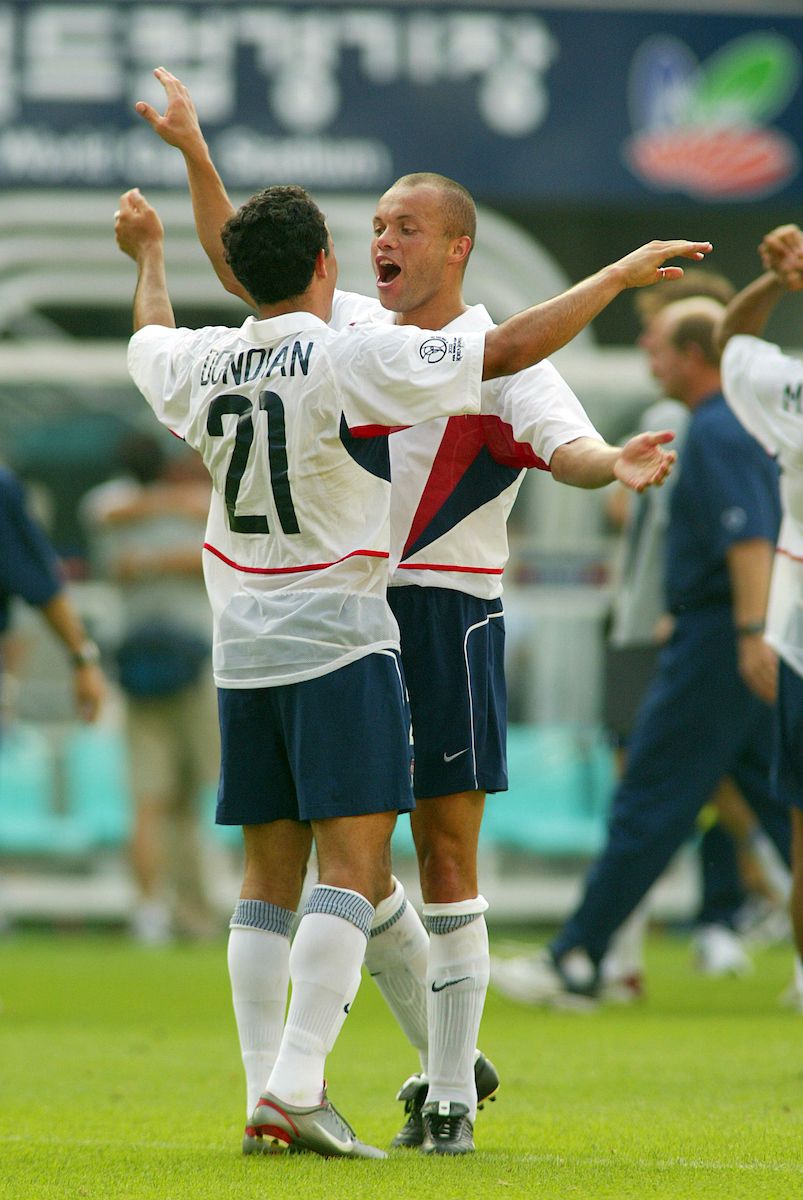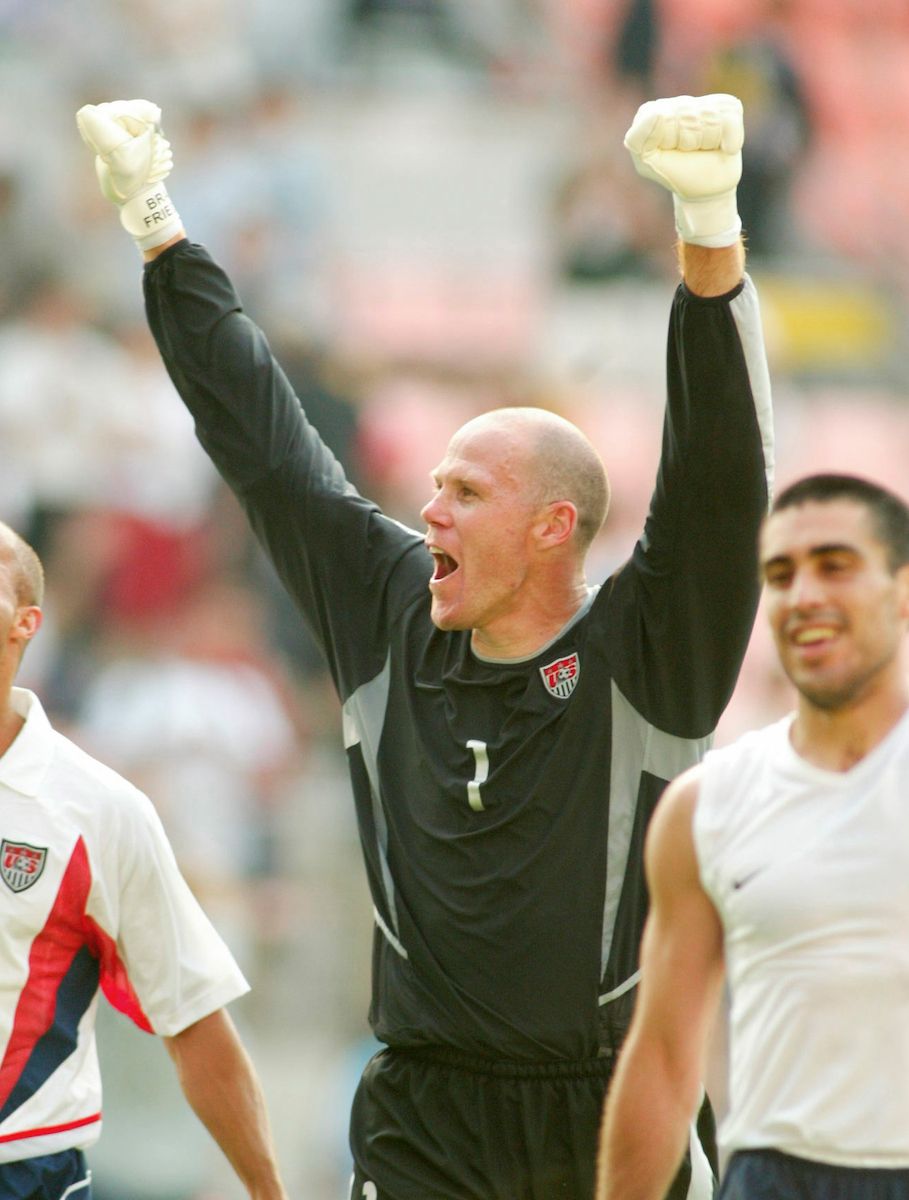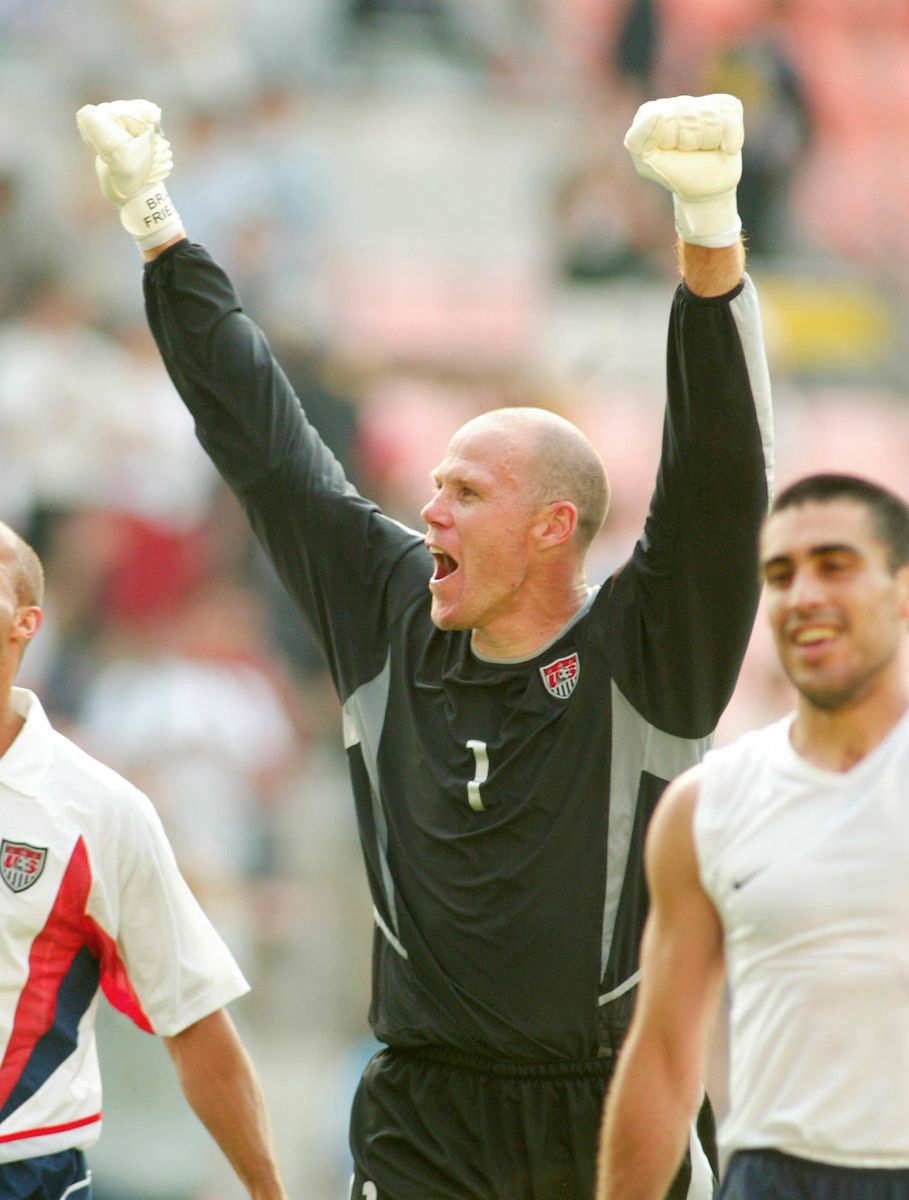20 YEARS LATER: USMNT Players Remember Run to 2002 World Cup Quarterfinals
Detailing the USMNT’s best modern era finish at the FIFA World Cup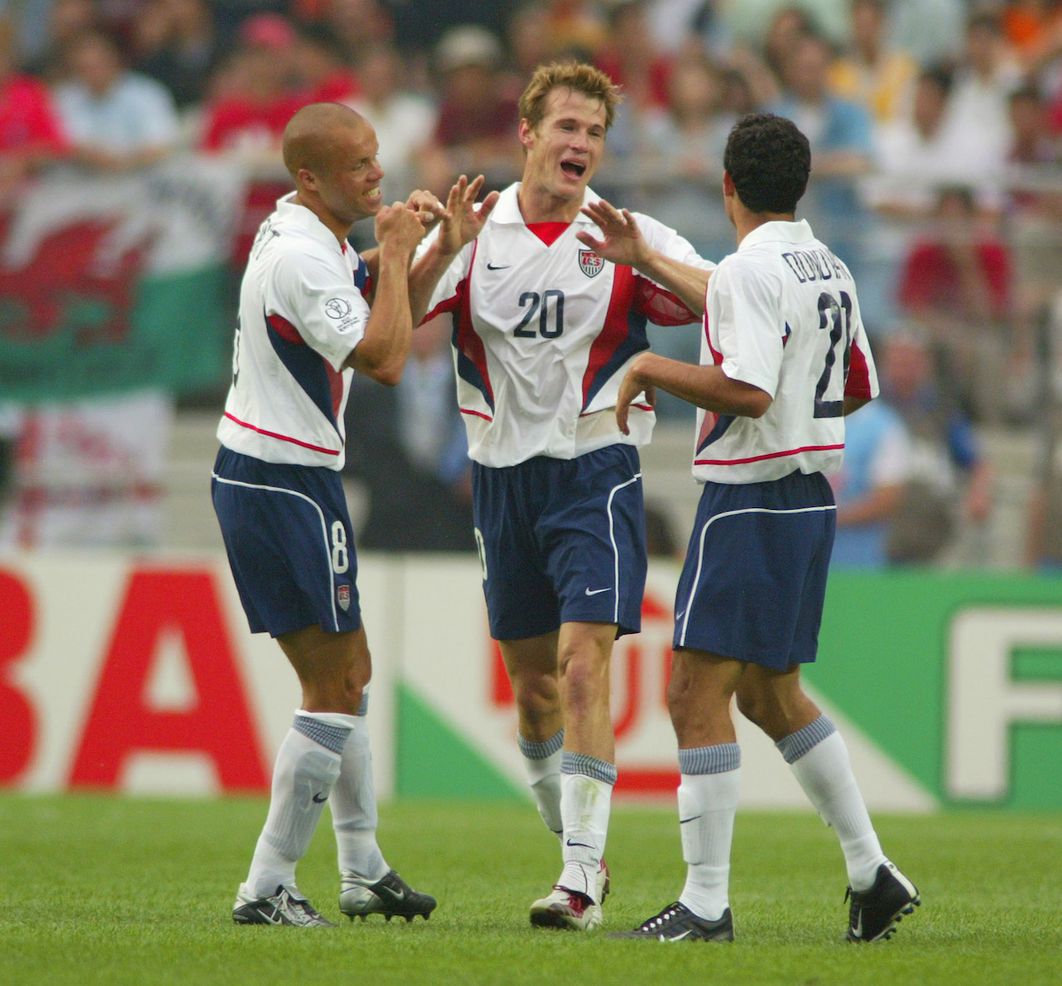
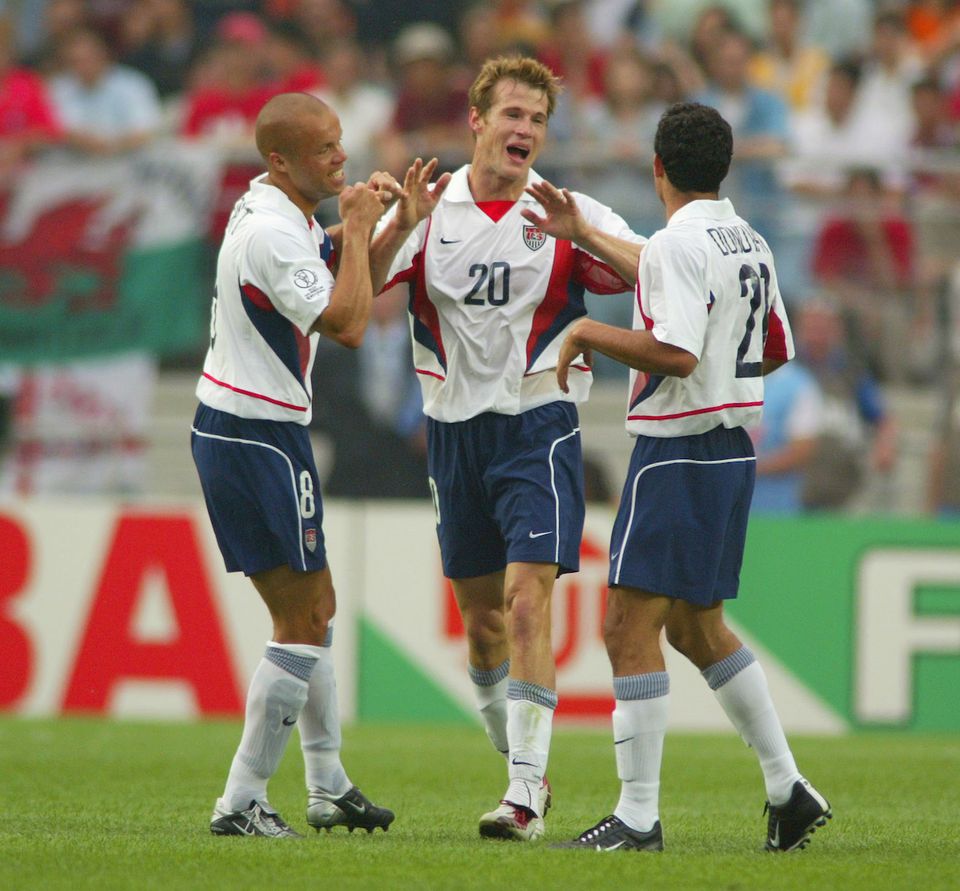


To celebrate the 20th anniversary of the USMNT’s memorable run to the quarterfinals of the 2002 FIFA World Cup, ussoccer.com presents a two-part series looking back on the team’s best modern era World Cup finish. In Part 1, we retraced the team’s dramatic run to qualify for Korea/Japan.
In Part 2, Landon Donovan, Brian McBride, Earnie Stewart, Claudio Reyna, Brad Friedel, Eddie Pope and Gregg Berhalter reminisce about the team’s incredible run to the 2002 FIFA World Cup quarterfinals.
In January 2002, two members of the U.S. Men's National Team who went on to make vital contributions at the FIFA World Cup in Korea/Japan that summer were uncertain whether they would even be part of the squad.
Forward Brian McBride was recuperating from a blood clot that kept him sidelined for most of the previous year.
Teenager Landon Donovan had played in a handful of qualifiers. Despite his great potential, was the 19-year-old midfielder too young to make the team?
Two phone calls helped determine each players' World Cup fates.
While sitting on his couch with his wife, McBride watched the USA clinch a World Cup berth with its 2-1 victory against Jamaica on Oct. 7, 2001.
"I was just so elated that we qualified," he said.
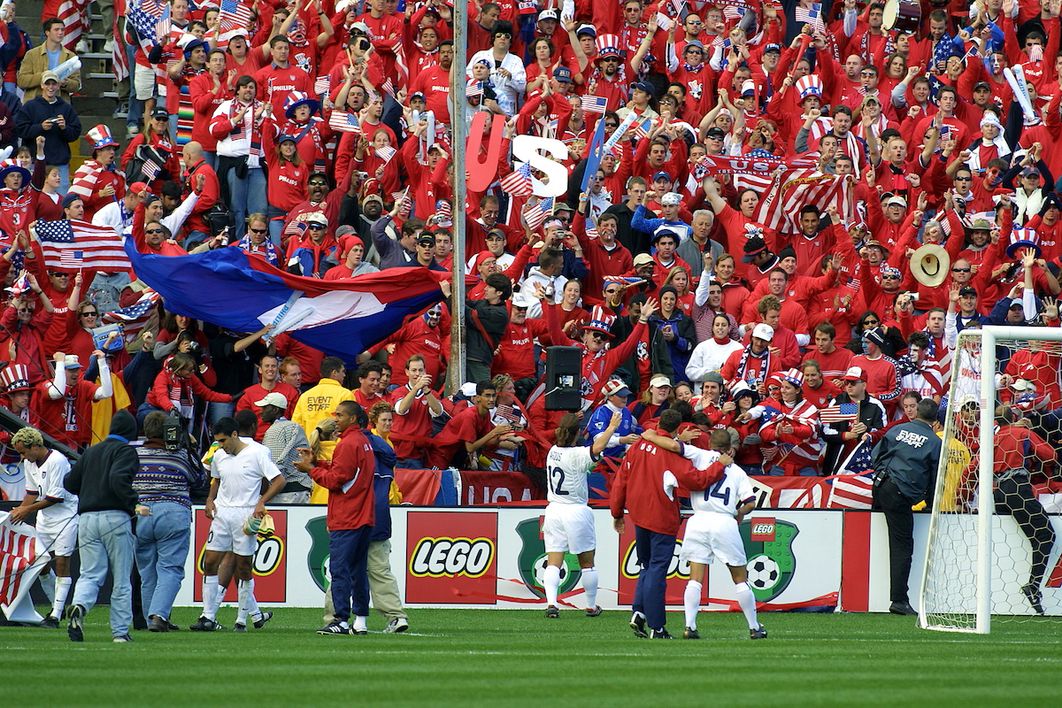
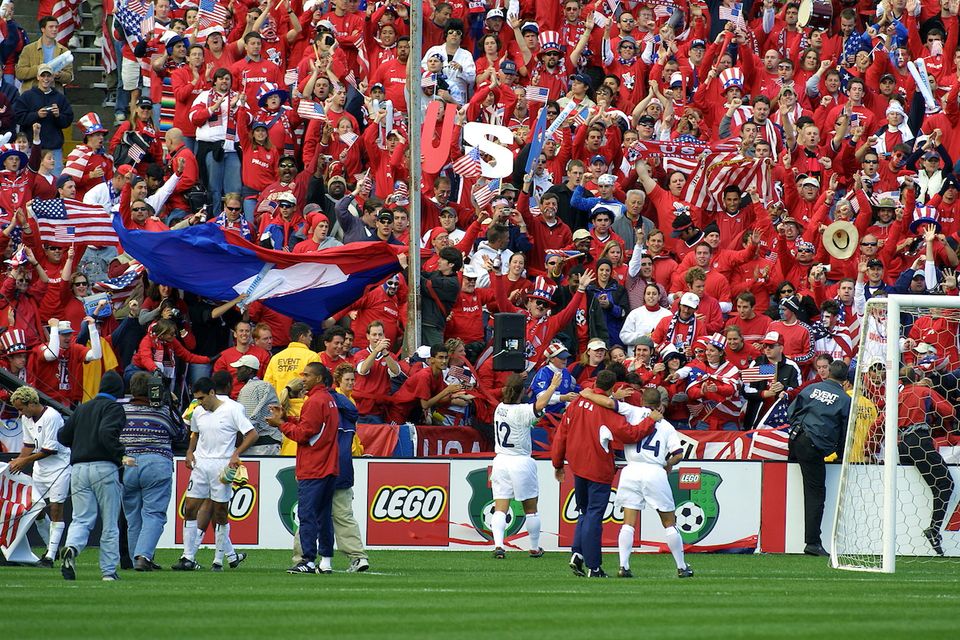
McBride, who had missed most of qualifying with injuries, including surgery that removed a piece of a rib that was pressing on a vein and causing the clots, was still taking blood thinners.
"I knew that I wasn't going to be able to play competitive soccer again until March 2002," he said. "That's what the doctor told me. My focus was just trying to stay fit and be ready once I was cleared to play."
The fearless 29-year-old forward received a pleasant surprise just before Thanksgiving when it was determined he could return to action. Now, it was up to head coach Bruce Arena.
"There were a lot of unknowns," he said. "Would Bruce pick me because of a lack of games and lack of time with the ball?"
The USMNT was scheduled to play an international friendly in South Korea on Dec. 9.
"I was on the phone immediately, hoping to be part of that," McBride said.
He was. While McBride didn't play, he trained with the squad. He was invited to January camp and was named to the Concacaf Gold Cup team.
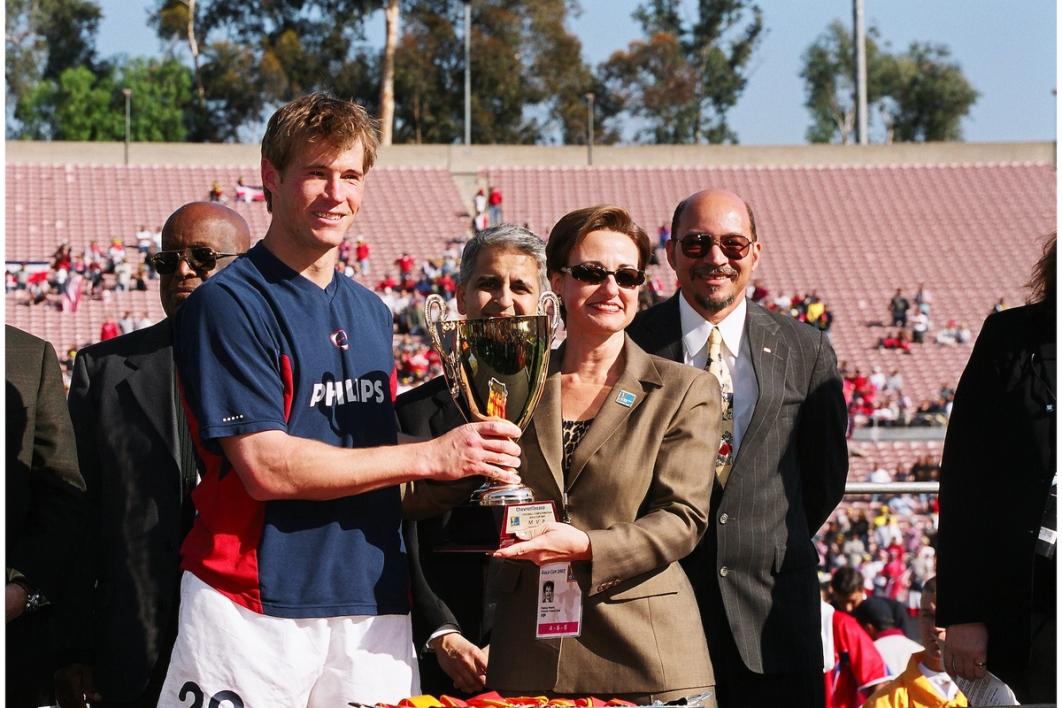
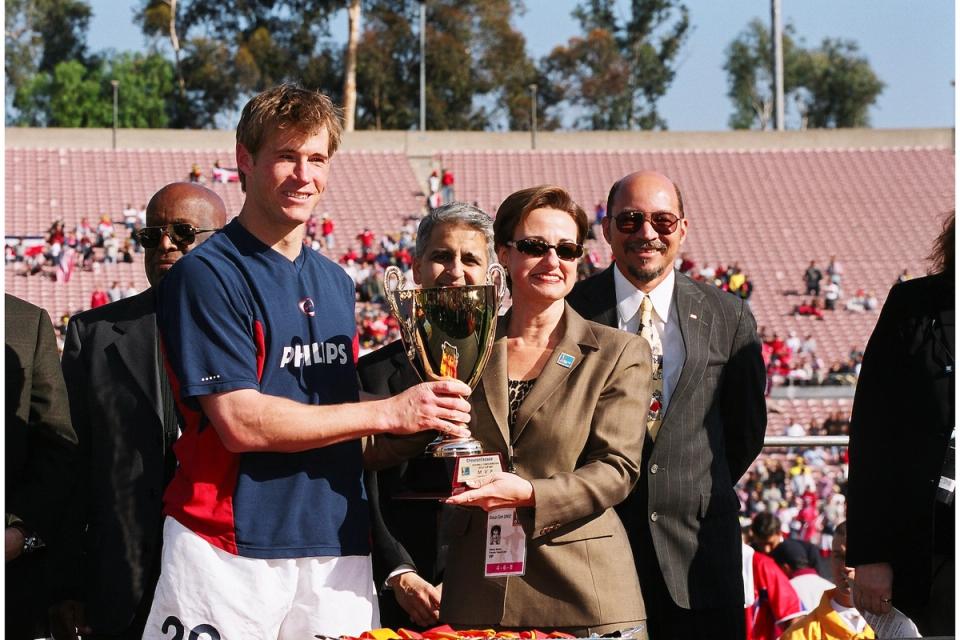
McBride (pictured above) finished as the tournament's leading scorer with four goals – tallying a penalty in a group stage win against Cuba before recording an impressive 12-minute hat trick during the first half of a 4-0 quarterfinal win against El Salvador. The goal haul earned him tournament MVP honors and the USMNT won the confederation championship for only the second time.
"The team performed extremely well," McBride said. "Everything was really positive on my end. So there was some real momentum. It definitely gave me the confidence I needed."
Donovan faced another dilemma. He was healthy, but inexperienced internationally (one goal in eight appearances since making his debut in 2000). He had played in a handful of qualifiers, including drawing the game-winning penalty kick late in the Jamaica match.
"I didn't know where I was on the pecking order," he said. "I knew going into that January camp that I had to be really good. I was probably the most motivated I've been in my career."
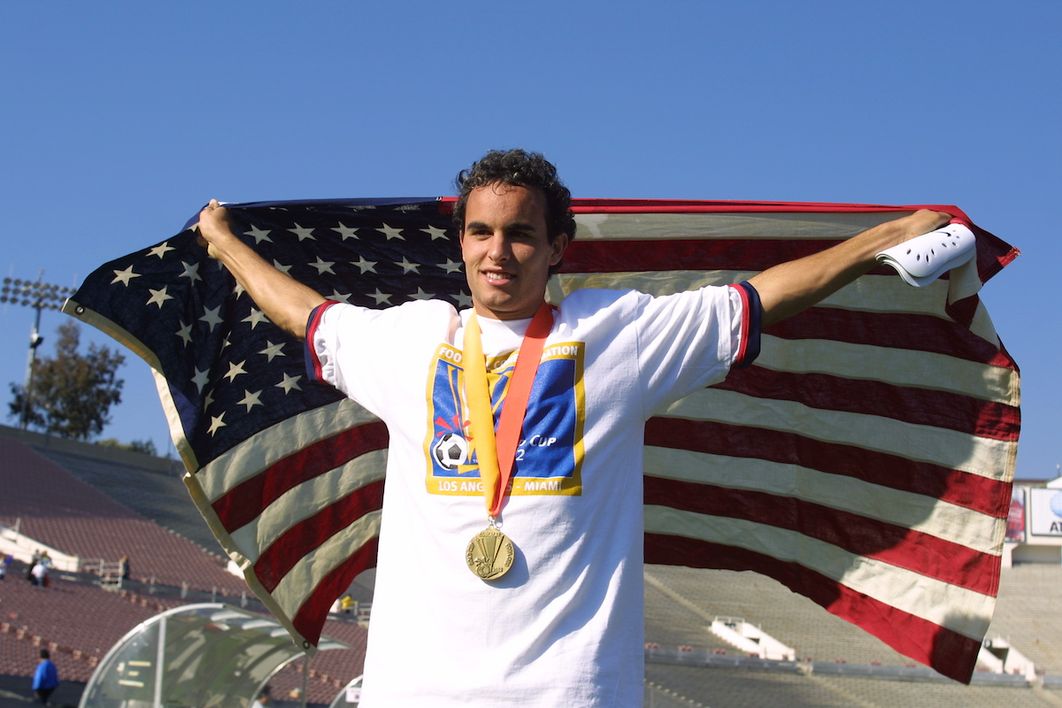
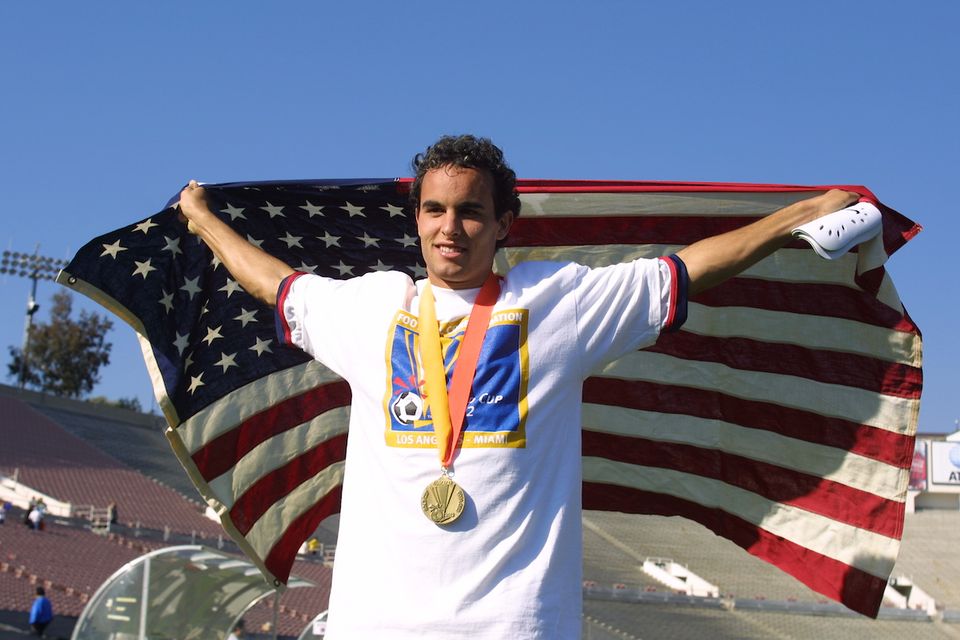
Not only did Donovan start all five Gold Cup matches; he also excelled. He scored the first U.S. goal in the 35th minute of its opener in a 2-1 win against Korea Republic. He also converted the first penalty kick in the semifinal shootout win against Canada.
Several weeks later, Donovan got a phone call from Arena.
"He said, 'Happy to let you know that you've made the World Cup team,' " Donovan said.
The elated teenager called his parents.
"I made the [effing] World Cup team!" Donovan remembered telling his mom. "Just being so excited. For any kid to play for their country in a World Cup, it's the ultimate dream."
Putting together the right team for a World Cup is always a risky proposition and unique balancing act.
"As a coach, sometimes we see potential and we say, 'Okay, but I'm not quite sure he's ready yet,' " Donovan said. "But the reality is you don't know. I just give Bruce so much credit for taking a chance on not only me but on DaMarcus [Beasley] and giving us the opportunity."
Beasley, who along with Donovan was a member of the U.S. Under-17 National Team that finished fourth at the 1999 U-17 World Cup, turned 20 that May 24.
"I think he saw in us something that was an ingrained in us since we were 15 and 16 with John Ellinger and the U-17s -- we just didn't fear anybody," Donovan said. "I think he liked that as we were playing Portugal with all these big names. But we didn't care. We respected them a lot, but we didn't fear them. I think that gave us a little bit of an edge because he had a few guys who are just willing to run themselves into the ground and weren't fearful."
Regardless of who a coach selects, he is likely going to leave several talented, deserving players disappointed and the public second guessing as to whether he chose the right ones.
"Bruce's strength is the building of squads and togetherness," team captain and midfielder Claudio Reyna said. "Sometimes knowing if he wanted to have the right players, and maybe not the best players. He always wanted a group that was flexible and that would put the team above anything."
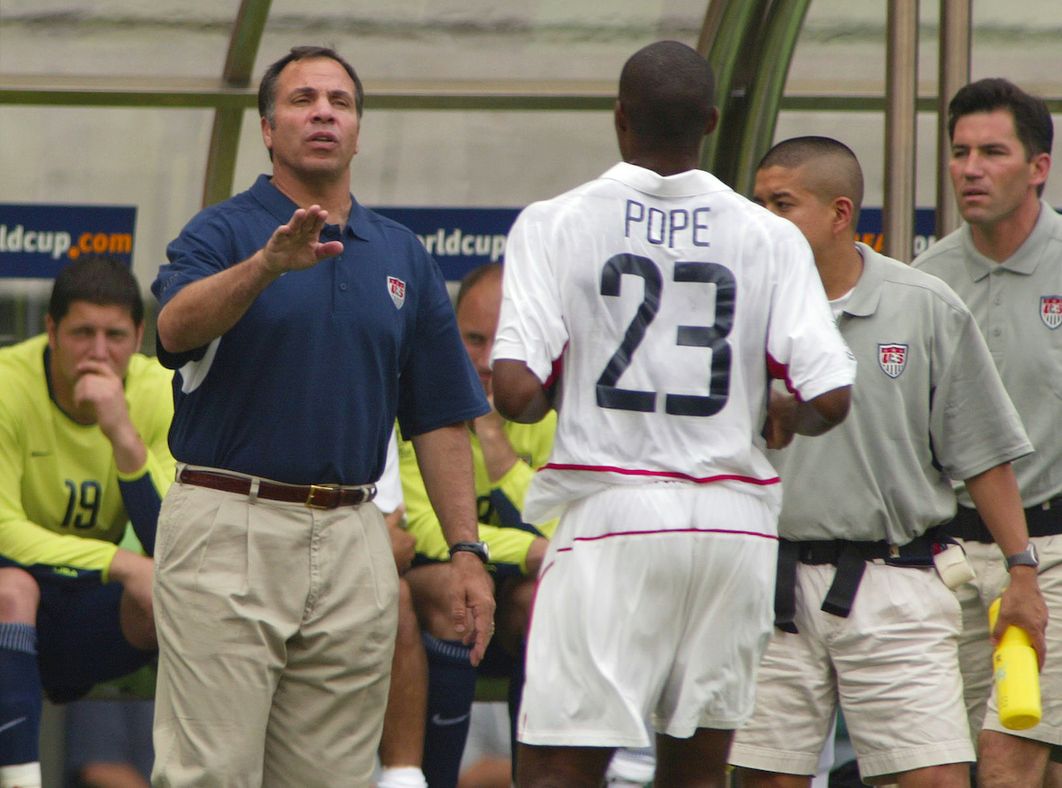
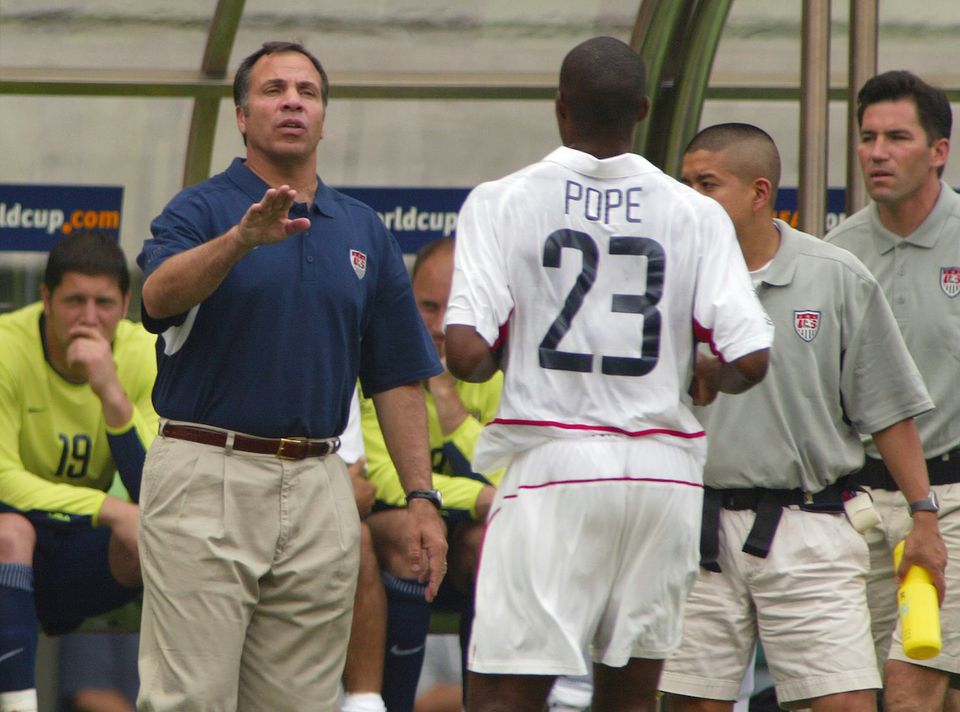
Reyna and midfielder Earnie Stewart had a conversion with Arena about the 23-man roster.
"It was eating him up to make final selections and there were some really, really good players that he had to leave off, good people that he had to leave off," Reyna said. "You may not understand how hard it is for a coach to make those decisions. I just remember him one time talking to me. 'Geez, I feel terrible about guys that I have to leave off because they deserve to be on the plane to Korea.'"
Defender Eddie Pope felt Arena chose the right 23 players.
"Great personalities, good people, good teammates,” he said. “Sort of cliche but guys who are willing to fight for each other, cover each other, go the extra mile. Those things are really important in a team setting, especially on what you're what you're going up against."
More players were performing regularly on European clubs, honing their skills and confidence that they could hold their own and even beat the best.
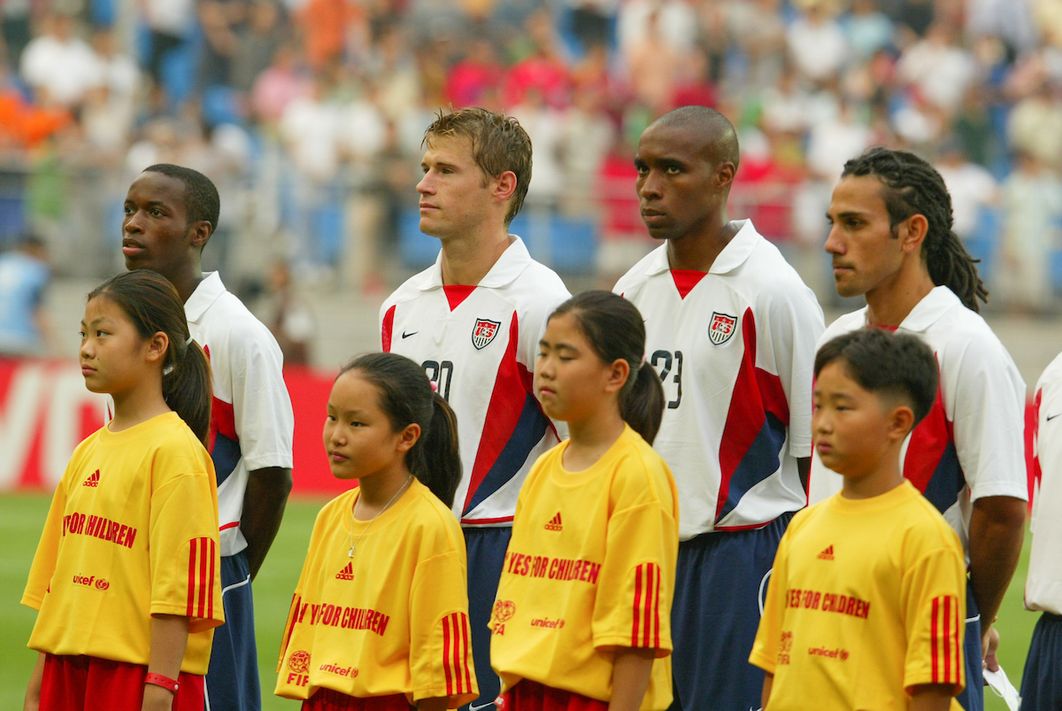
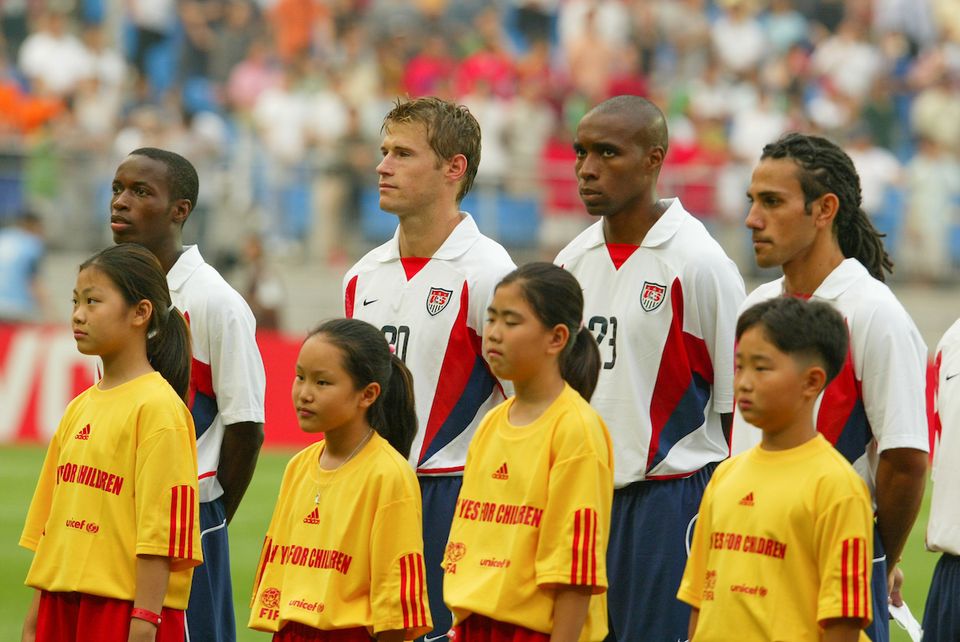
"We had a majority of the players playing with clubs in Europe, or the young players like DaMarcus and Landon that were coming up, and the MLS players who had the quality of play in Europe, like Eddie Pope and Jeff Agoos,” goalkeeper Brad Friedel said. “It was just a real quality group of players that were assembled. That was the first time that we had a lot of players playing week in and week out against the players that we were going to face in the World Cup."
The specter of a disappointing showing at the 1998 World Cup in France was another motivating factor. The U.S. lost all three of its group stage matches.
"They were highly motivated. I think a lot of it came from disappointments from 1998,” Arena said, adding that “2002 was very challenging. They stepped up to every challenge."
With the World Cup being hosted by Asian countries for the first time, the USMNT left earlier than usual to get accustomed to the time difference. There is a 13-hour difference between Korea and the Eastern U.S. time zone.
"We left four or five days earlier than normal, based on the science of Pierre Barrieu [the team's strength and conditioning coach] at the time, and to adapt," Brian McBride said.
It turned out to be a good move for the Americans, who were based in Group D along with Portugal, favored to go deep in the competition, host Korea Republic and Poland.
Not many soccer observers gave the USA, which went three-and-out at France ‘98, much of a chance against Portugal in its World Cup opener in Suwon on June 5. The USMNT was 300-1 longshots to win the cup.
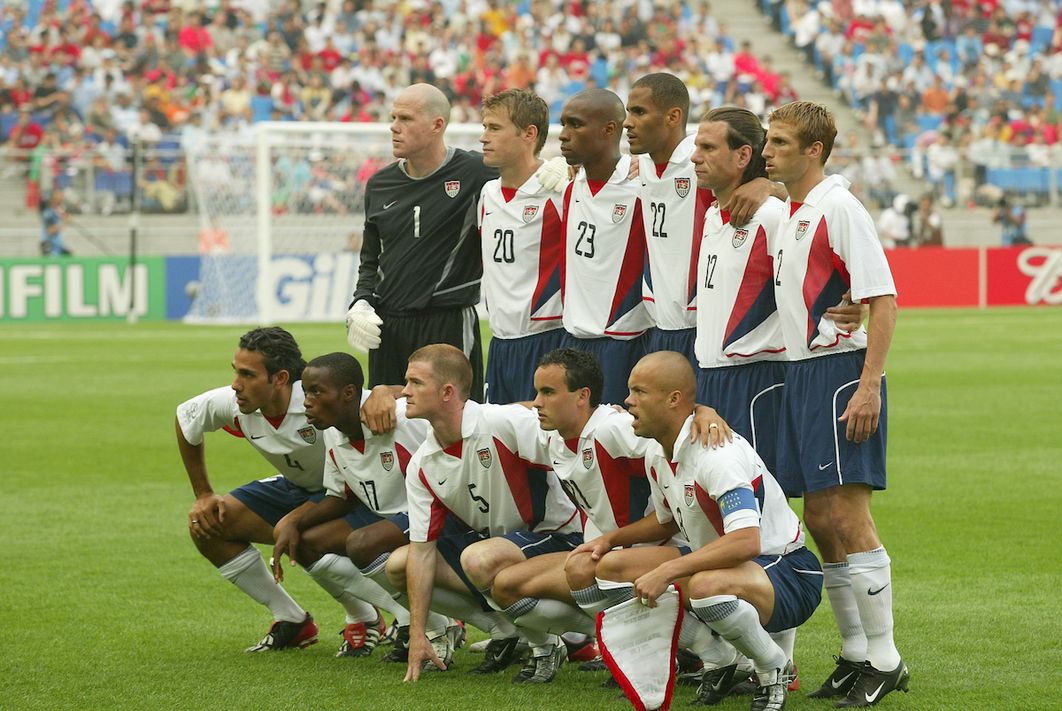
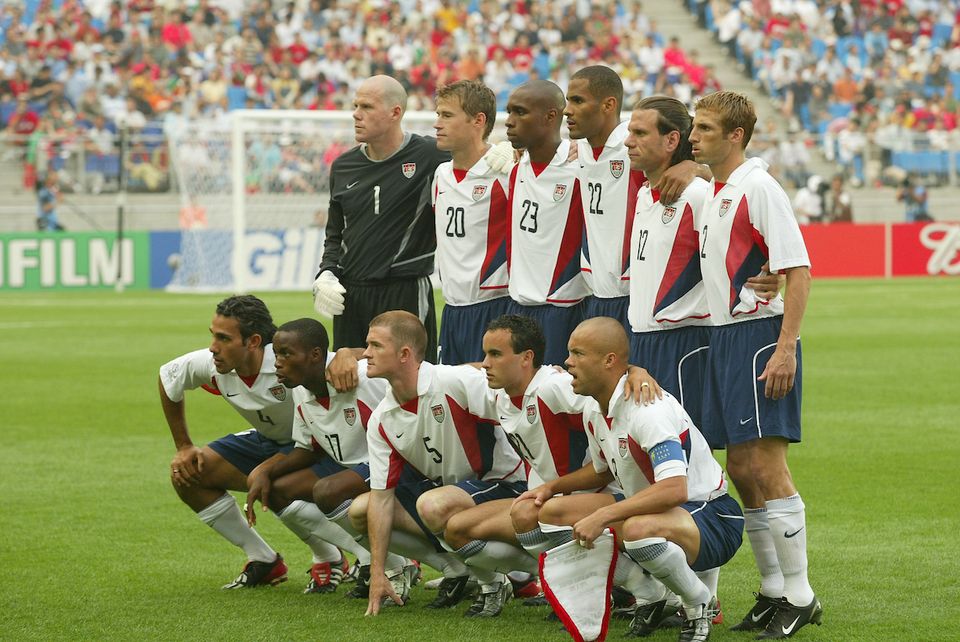
Since returning to the World Cup after a four-decade absence in 1990, the USA had a 1-8-1 record, including a 0-6-1 mark against European sides. The Americans also entered the match with a five-game World Cup losing streak since its 2-1 upset of Colombia at USA ‘94.
The Portuguese boasted respected internationals such as the great Luis Figo, the 1991 FIFA World Player of the Yea,r and goalkeeper Vitor Baia, among others.
But this was going to be a different World Cup. In the tournament opener on May 31, upstart Senegal upset defending champions France, 1-0, giving all underdogs some hope.
Now, it was the USA's chance to turn some heads.
"Bruce mentioned they did come off long European seasons, maybe 60-65 games with top clubs and [in the UEFA] Champions League," Reyna said. "They weren't fully up to speed. We were flying. We were really fit. We had a great training camp in North Carolina. We were sort of foaming at the mouth. They weren't up to speed, and we were able to punish them."
The Americans surprised the Portuguese by deploying a high press.
"We played in a way that caught Portugal off guard," Pope said, "picking up the ball and attacking so quickly. It was a little bit of a perfect storm. We were really good, and they didn't have their best day. And before you know it, the ball was in the back of the net. ... When it rains, it pours."
By the 36th minute, the U.S. had stormed to a stunning 3-0 advantage. It was only the third time in World Cup history that the Americans had scored that many goals in a match. The first two occasions were at the first competition in Uruguay in 1930.
"They were shellshocked," Stewart said.
"It was certainly a sucker punch that no one expected," Reyna said. "Bruce's gameplan was to go out in the first 30 minutes and put them under pressure, press them, make it uncomfortable for them. I imagine they expected a team that would drop off and sit back and hold on for a tie. That was the complete opposite mentality that we had, and it paid off."
It paid off only four minutes after kickoff. Stewart sent a corner kick to McBride, who headed the ball on target off Baia's left hand. Standing only yards away from the net on the right side, John O'Brien cleaned up and slotted the ball home with his left foot.
"You want someone super technical on the ball," Pope said of O'Brien. "It was a nice goal."
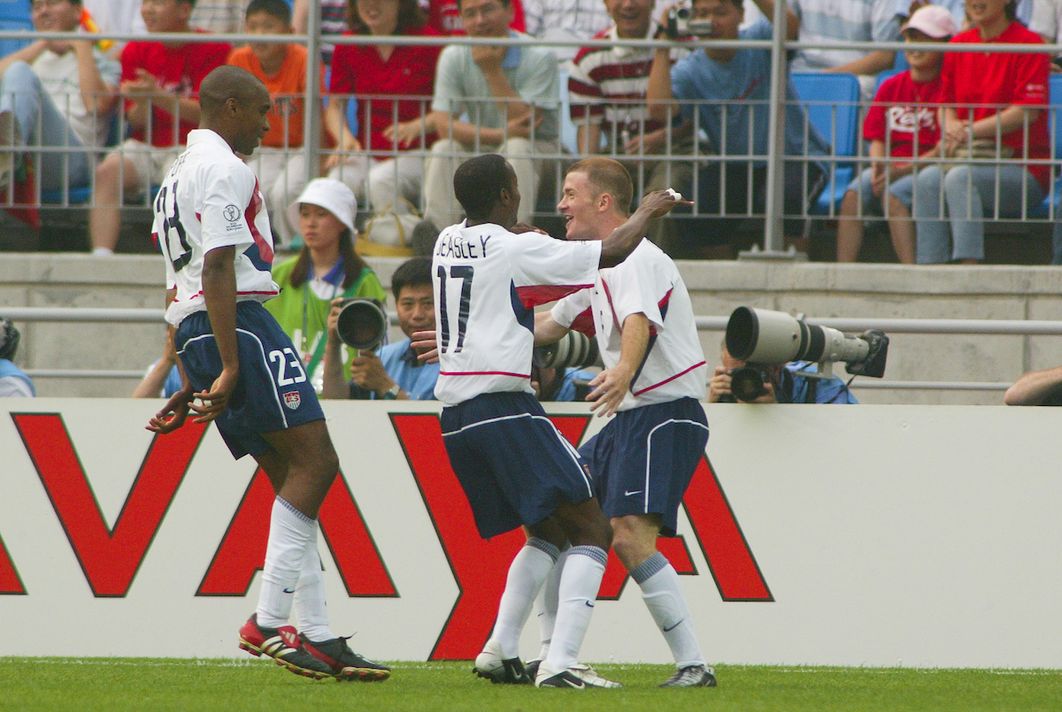
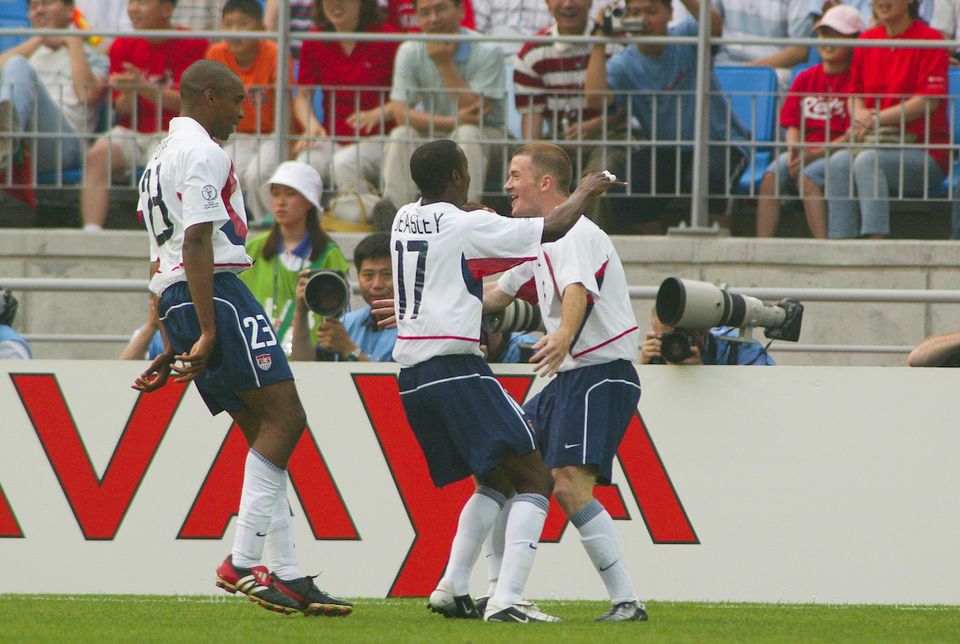
It was the U.S.'s first lead in 454 minutes of World Cup action, since the Colombia match.
"The day before in practice, I kept positioning O'Brien where to be on a corner," Arena said. "I remember physically just moving him with my hands into this spot. He ended up scoring a goal there."
The U.S. was far from finished.
"There was a feeling of just extreme confidence that we would continue to mount this pressure," McBride said.
Donovan's cross from the right flank deflected off the head of defender Jorge Costa for a 29th-minute own goal to make it 2-0.
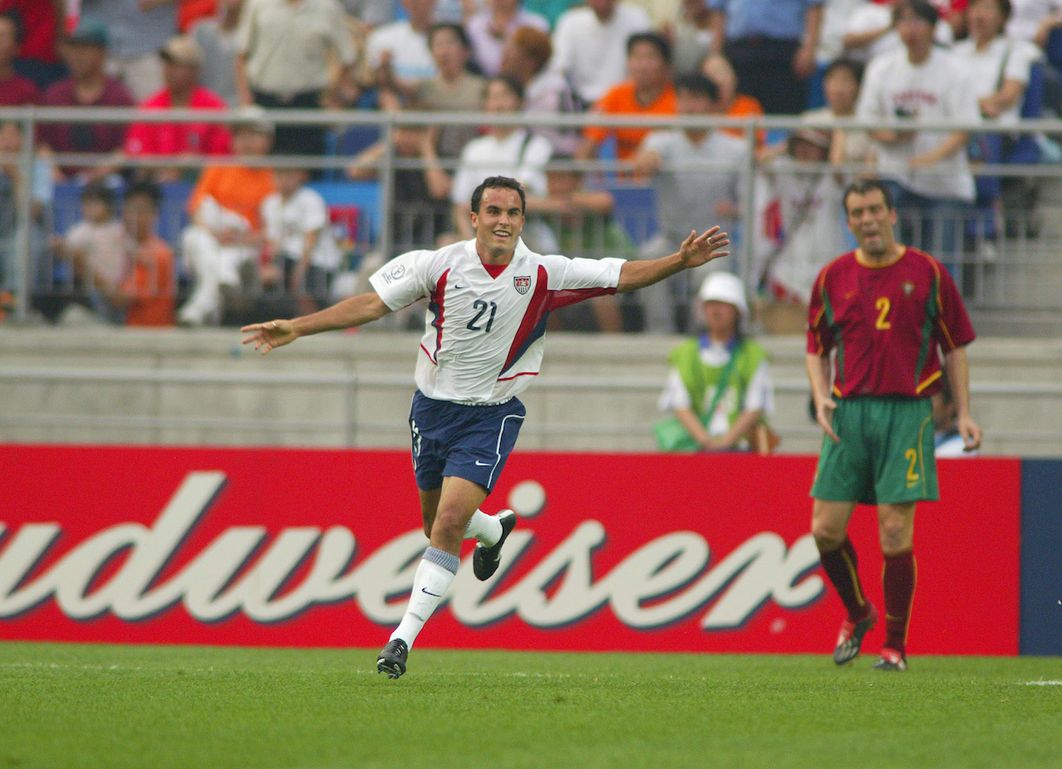
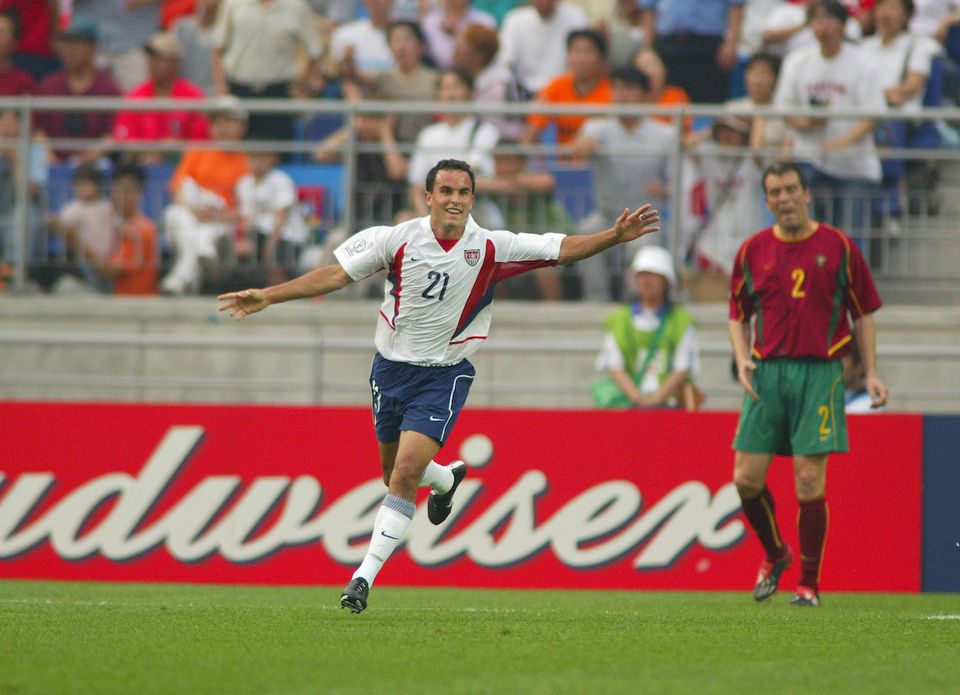
"It was hard to believe," Donovan said. "We basically had three chances, three big moments to score and all three of them happened. Even if another team is better, if you're able to get on a chance and bury it, it changes everything. Pretty exhilarating."
Seven minutes later, McBride's diving header off Tony Sanneh's right-wing cross made it a stunning 3-0 margin. McBride, who tallied the lone USA goal in France, became the first American to score in two World Cups.
"When someone told me I was like, 'Oh, that's cool.' But that's never been my main goal," he said. “It's not something that I sent out to accomplish. It's just an added bonus, but never once was something that I talked about."
The Americans were elated, the Portuguese were in disbelief.
"You can see our confidence quickly grow and at the same time to see all the Portuguese players stunned, looking at the coaches, the players on the bench," Reyna said.


"I don't think there was a moment any time in the game that anybody thought, 'Oh my God, what's going on over here?' " Stewart said. "Everybody was just concentrated on getting a result."
"It was really important to get those three goals before halftime because you saw how they came out much more prepared for the second half," McBride said.
Three minutes after McBride's goal, Portugal pulled one back. Beto headed Figo's corner kick that O'Brien attempted to clear. The ball bounced back to Beto, who beat Friedel.
"Earnie and I snapped our heads back and we looked up behind us to the clock and check the minute because we knew that we needed to get into halftime at 3-1, four if we could," Friedel said. "We didn't look at each other. If you gave them another goal with momentum. They had some really talented players. They could play and we could play but they were good. ... The only other thing I remember is the final whistle."
Between that goal and the final whistle, there were some heart-thumping minutes.
"At halftime, it was basically hold on for dear life because we know the onslaught is coming," Donovan said.
Portugal closed within 3-2 in the 71st minute. Agoos, making his World Cup debut at age 34, tried to clear a cross by Pauleta, but placed it past Friedel.
"Who knows what would have happened if the game would have gone another 10 minutes?" McBride said.
Friedel held steady in the net. "Brad made some really good saves," Reyna said.
One of the unsung heroes was Sanneh, who set up a goal and neutralized Figo.
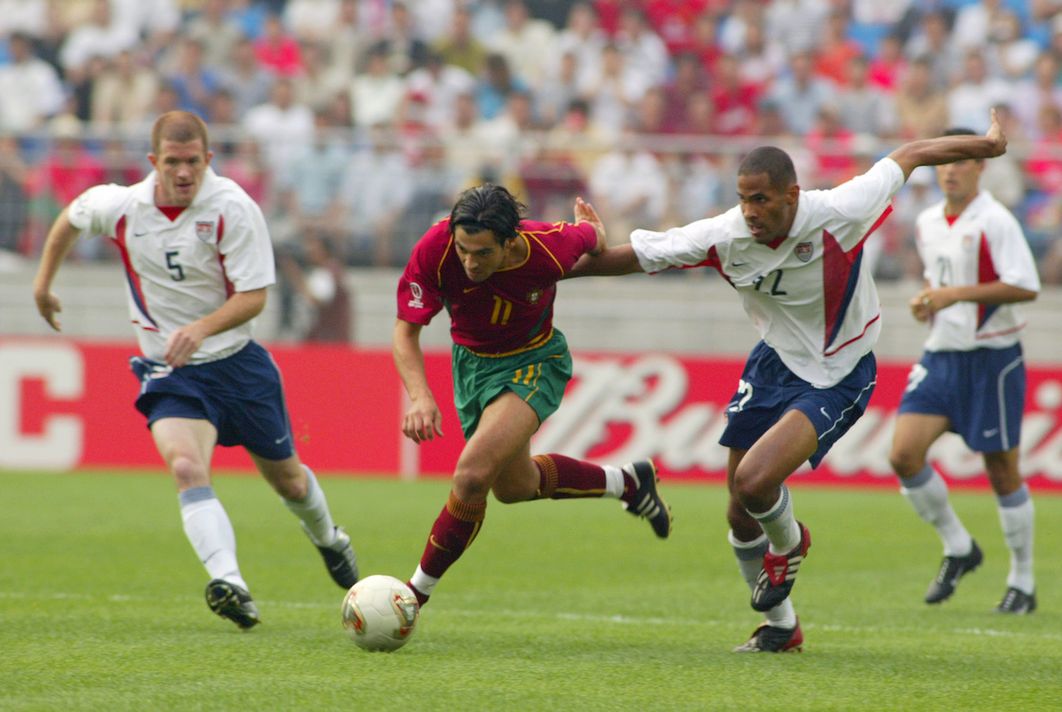
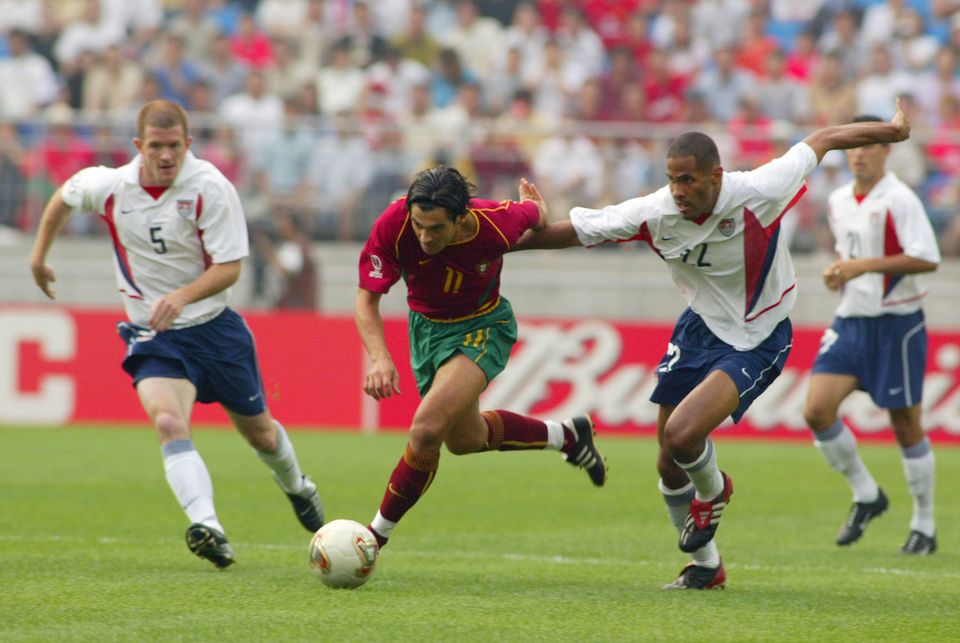
"Tony just gave him so many problems," Pope said. "Tony was in Germany at the time. Another player that just wasn't intimidated and kind of bullied him a little bit. We had little battles that were happening all around the field. That was that was one of the bigger ones with Tony Sanneh and Figo. Tony is able to get forward, doesn't get tracked by him and gets an assist."
The USA also shut up some naysayers.
"This guy from CNN was talking about how easy this game was going to be against the United States," Stewart said. "We actually bumped into him on the way to the hotel after the win which was pretty nice. He took a little bit of heat there, but he took it well."
As well as the U.S. played, Arena felt the final margin could have been greater.
"To be honest with you, we should have won that game going away," he said. "We made a mistake at the end of the first half to let them score. The second half they got another goal, made things a little crazy, but we held on and did an outstanding job. It was a great accomplishment for our team."
Even before taking on Korea Republic in front of 60,778, drum-banging, flag-waving fans dressed in red at Daegu World Cup Stadium on June 10, the Americans had a good inkling of what they were in for. On Dec. 9, 2001, eight days after the World Cup draw, the USMNT played the Koreans in a friendly at Seogwigo, Korea.
The team learned how fervent their supporters could be.
"The commercials that would pop up on TV, the Coca-Cola symbol at the bottom, there was someone teaching fans, Koreans, chants or cheers," McBride said. "I still remember parts of certain chants because they were everywhere."
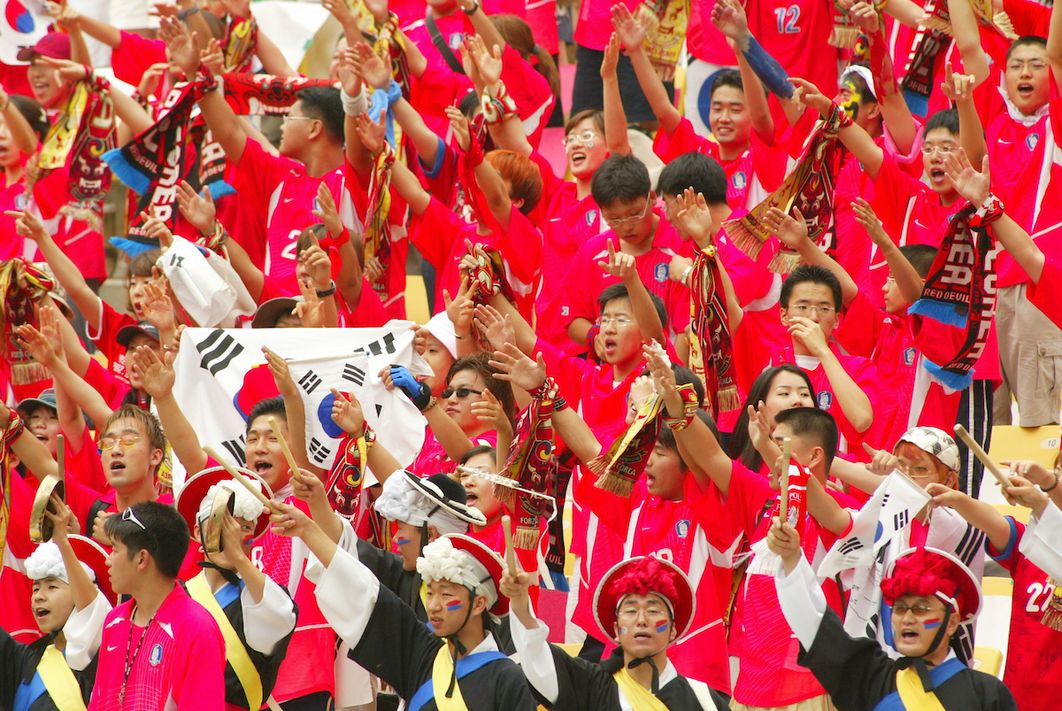
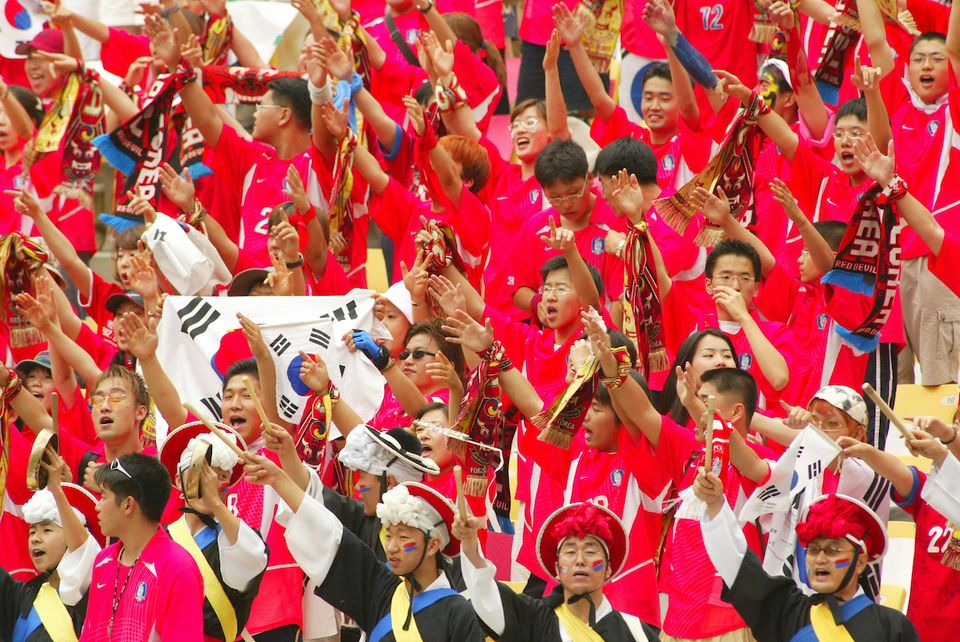
Adding fuel to the fire was an anti-American sentiment that stemmed from the 2002 Winter Olympics in Salt Lake City.
With one lap left in the men's 1,500 speed skating race, USA's Apolo Ohno, then in second place, tried to make a pass on leader Kim Dong-Sung of Korea, who drifted to the inside. Ohno raised his arms, implying he was blocked. Kim finished first but was disqualified. Ohno was awarded the gold medal.
What better way to take revenge on the USA at the World Cup than on Korean soil?
"They were kind of pumping up their country and players on that," Reyna said. "They gained a lot of momentum. It was an interesting tactic that it was almost kind of like planned by the country. They were fired up."
Regardless of if Koreans wanted to avenge the Olympics or not, their supporters' preparation continued in the weeks prior to the World Cup.
The memory was seared into Donovan's mind.
"I remember coming out for warm-ups and all you could see was red," he said. "Everyone had the same red shirt on. I've never seen that in my life. Anytime I close my eyes, I can see that memory so vividly. They were in unison chanting the whole game. It was the single best atmosphere I've ever been a part of."
The U.S. needed to quiet down the enthusiastic Korean supporters.
"The way that you quiet everybody, [whether] in college basketball or whatever sport it is, you score a touchdown, you can hit the three-pointer, you silence the crowd," Pope said. "We knew if we can just get that first goal, then they could be very quiet."
Clint Mathis, who was featured on the cover of Sports Illustrated that week and sporting a Mohawk haircut for the World Cup, provided the silence with a textbook goal in the 24th minute. Beasley won the ball in midfield and fed O'Brien, who had plenty of room to run down the left side. He sliced the ball to an onrushing Mathis, who trapped it and rifled a left-footed, 12-yard strike shot past goalkeeper Lee Woon-jae.
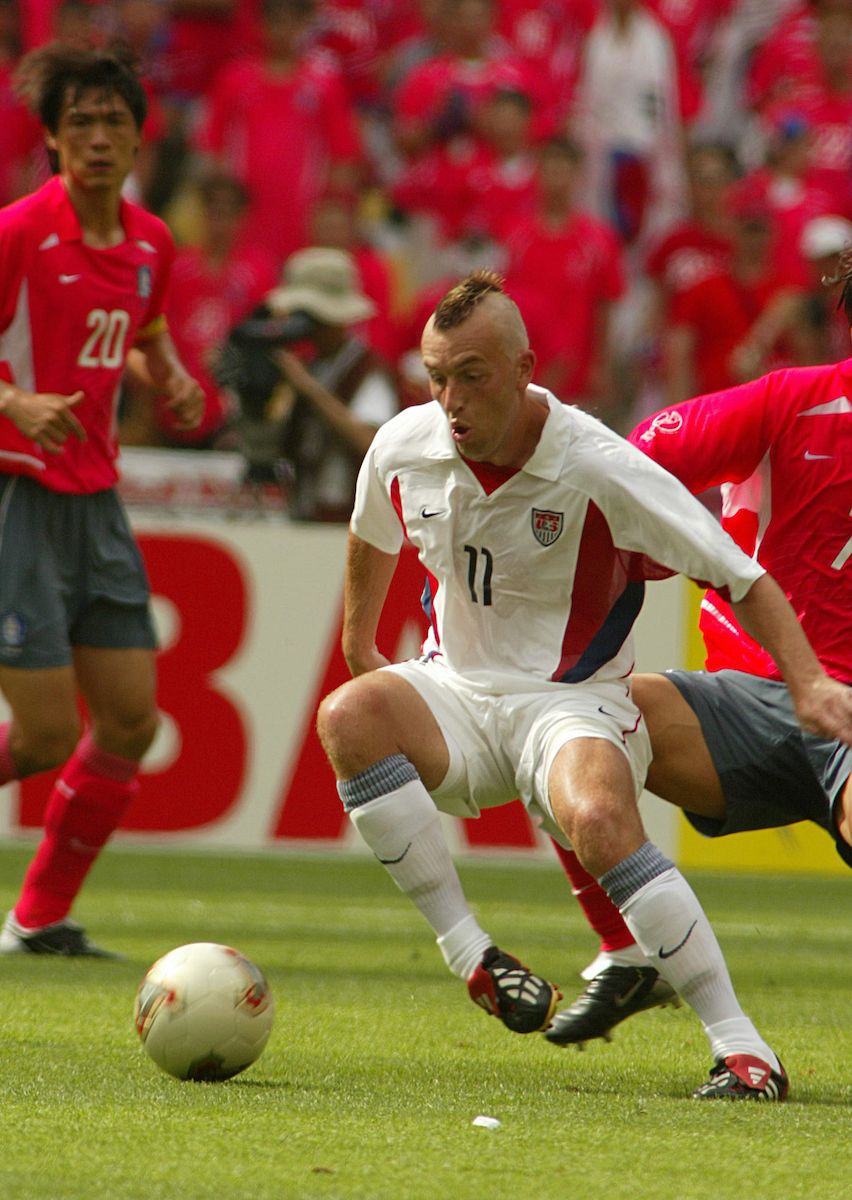
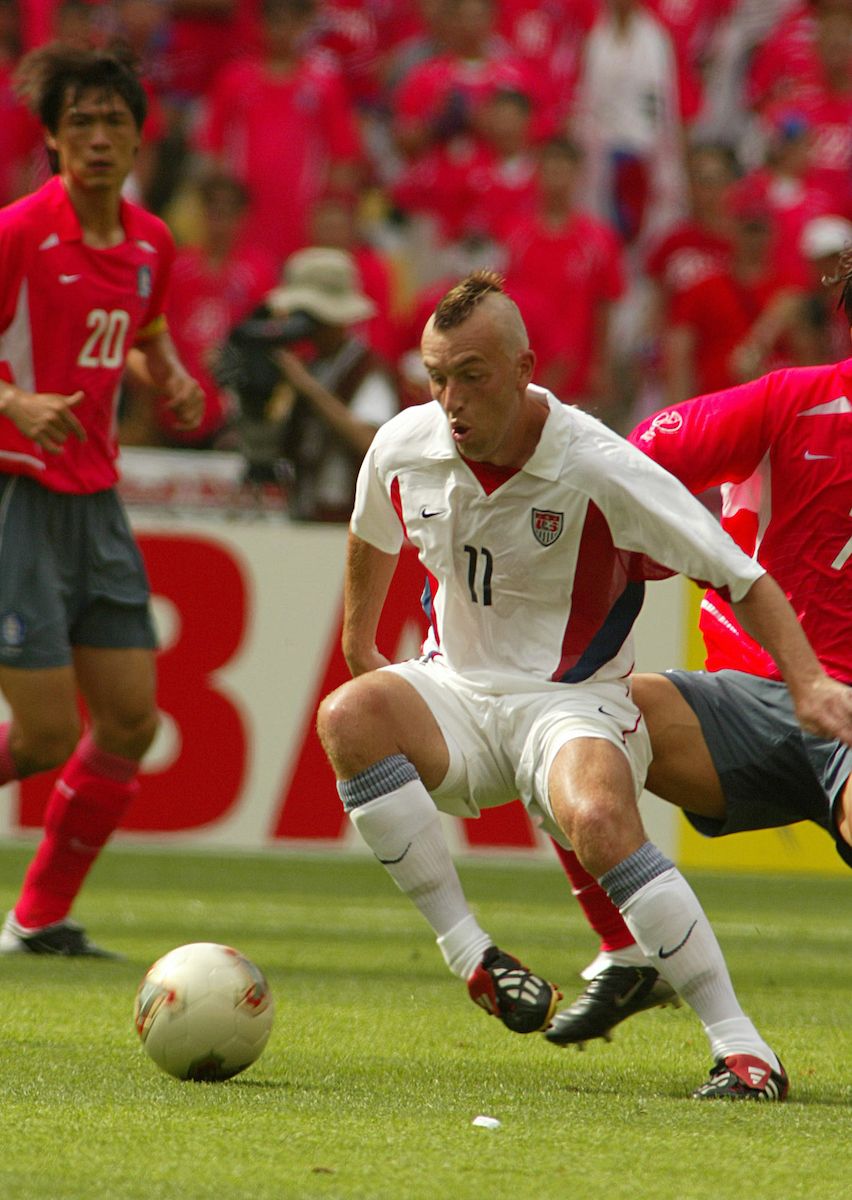
"Clint scored one of the greatest goals I've ever seen," Arena said. "Absolutely outstanding."
On the other end of the pitch, Friedel stood on his head, making nine saves and denying striker Seol Ki Hyeon three times on golden scoring opportunities.
"Friedel was amazing," Stewart said.
Friedel's shining moment came in the 40th minute, when the 6-4 goalkeeper dove to his right to knock away Lee Eui-yong's penalty kick.
"I guessed right," Friedel said at the time. "I knew he would go that way for some reason."
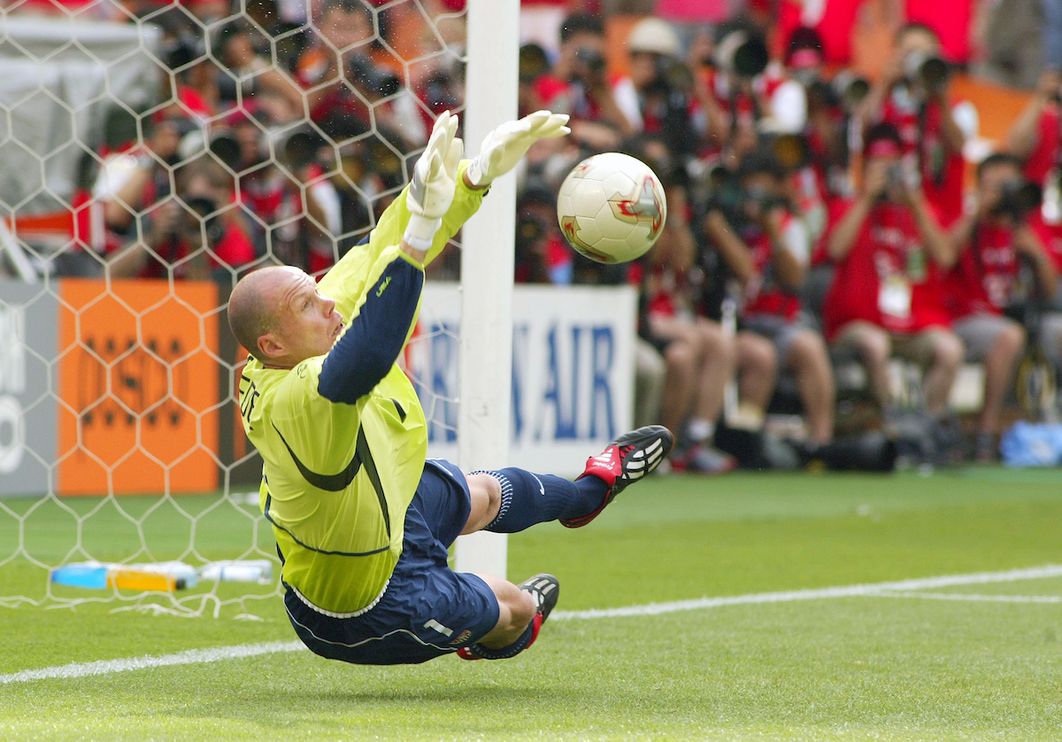
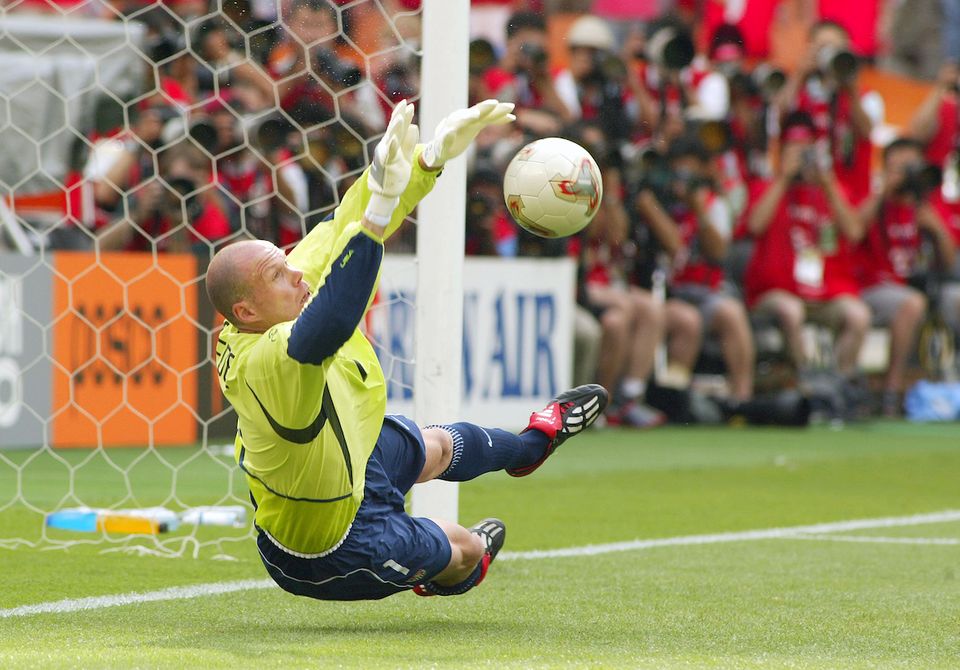
As superb as Friedel was, he could not stop Ahn Jung-Hwan's header from entering the net for the 78th-minute equalizer. Ahn celebrated by pretending to speed skate as the Koreans hadn't forgotten about the stripped gold medal.
To appreciate the result deep in enemy territory, the Americans were outplayed in the match by the host team but still walked out of the stadium with a precious point in a 1-1 draw against Korea, which defeated Poland in its opener.
They were outshot, 19-6 by the Koreans, who enjoyed a 57-percent advantage in possession.
“They really had a good side,” Stewart said. “It reminded me a little bit of ourselves, just in the sense of the chemistry they had; some really good players within that team that could score goals or make important plays."
The less said about the third and final Group D match against Poland the better. After putting so much energy into the opening two matches, the USA came up flat in a 3-1 loss in a June 14 encounter at in Daejeon. Poland, which had been eliminated, had nothing to lose.
"We're tired," Pope said. "Just all of the energy we put into the first two games, which was tremendous, the quality of the opponents, given the host nation."
It was an uphill battle as the Poles struck quickly. Emmanuel Olisadebe tallied in the third minute and Paweł Kryszałowicz found the net two minutes later.
McBride remembered "the feelings and utter despair that we felt at halftime."
"We're down knowing that the South Korea-Portugal game was tied at zero," he added. "We thought ‘Wow, we're going to have to score three goals because you never know how those teams are going to handle it.’ In that point in time, it was South Korea going and Portugal going through."
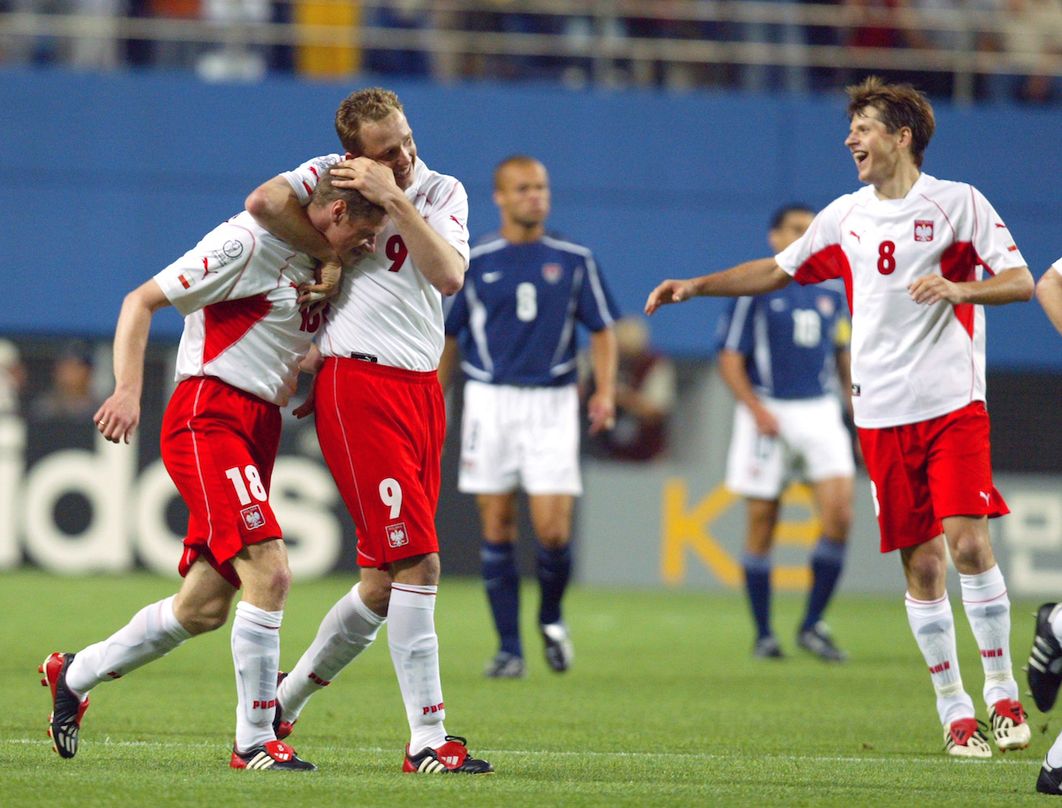
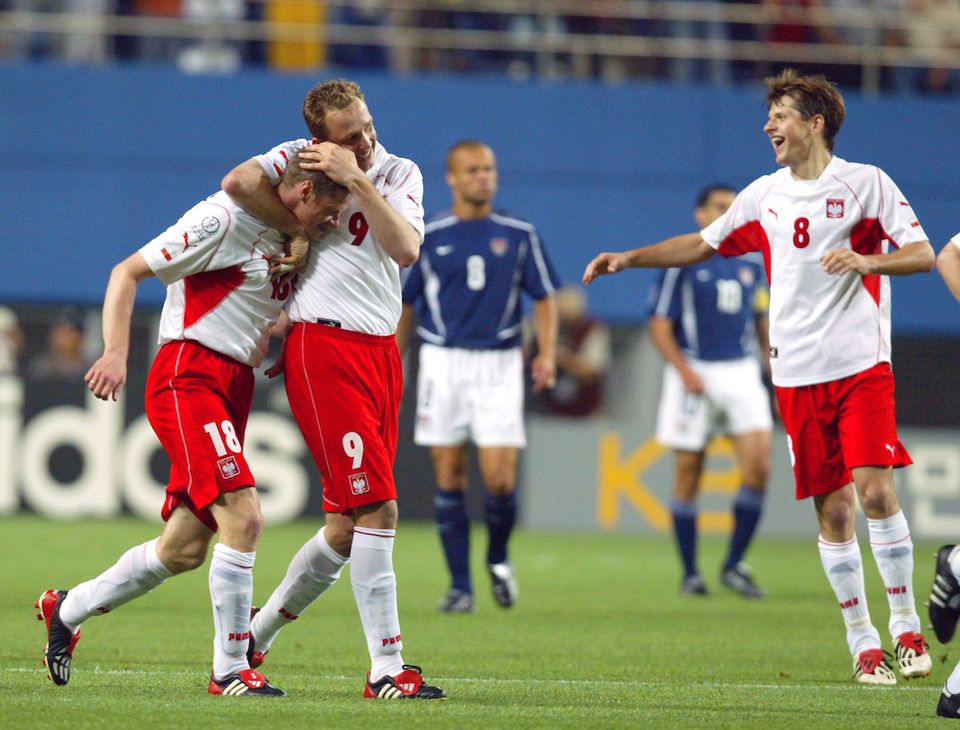
The degree of difficulty got tougher as Marcin Zewlakow made it 3-0 Poland in the 66th minute. It could have been even worse if not for Friedel saving a penalty for a second straight match – this time on Jacek Krzynówek in the 75th minute.
"You're crossing your fingers. You're hoping something else happens,” Pope said. “But if there was a World Cup where craziness was happening, it was this one. We felt like anything can happen."
Donovan connected for his first World Cup goal in the 83rd minute to cut the deficit to 3-1, but he was in no mood to celebrate.
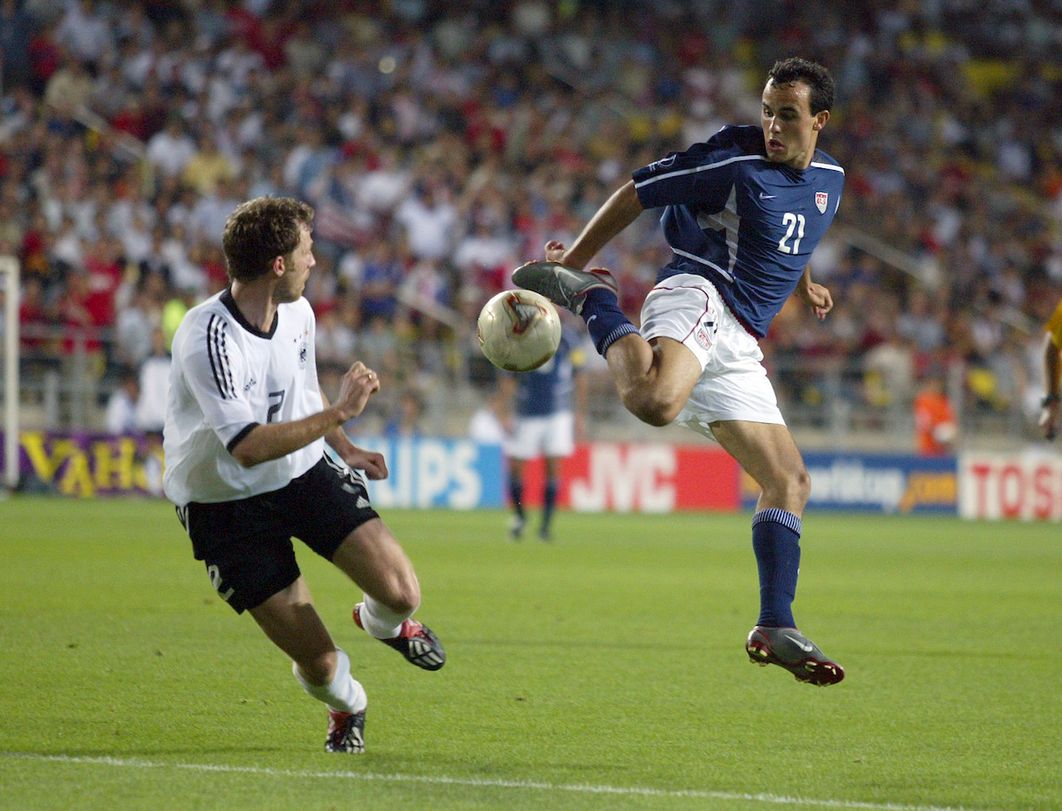
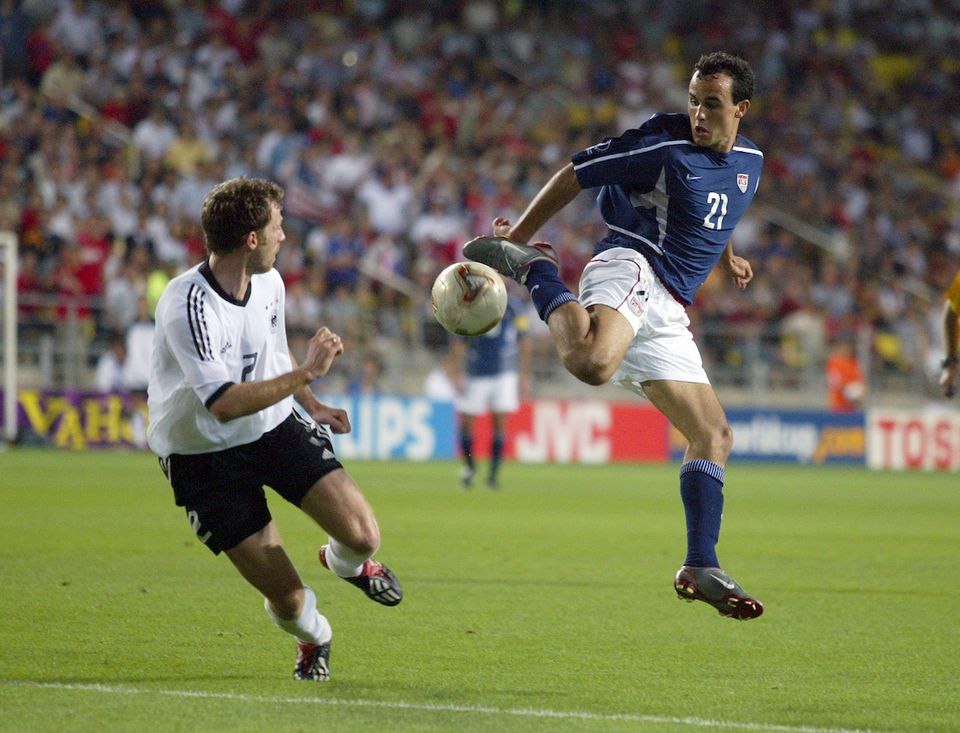
"It was hard, because how do you not celebrate and scoring your first goal in a World Cup when all you dreamed about as a kid was playing in a World Cup?" he said. "You can actually see on my face, this sort of battle between wanting to celebrate, almost being pissed off that we're losing but then trying to get back quickly to midfield, so we have a chance to go try to tie the game. It was a really challenging moment because I really wanted to let go and appreciate everything I had done to put myself in that position, but the reality is we're losing the game. So that that trumps the feeling."
McBride, who was sitting on the bench after he was replaced by Joe Max-Moore in the 58th minute, remembered American fans cheering late in the match.
"Three or four rows behind us, I hear our fans start cheering and we're thinking, wait a second," he said. "There were South Korean fans at the game. and then they started cheering. Did they score? They scored. We just had the feeling of despair and then jubilation that we would have another opportunity to play a game and makeup for being very lackluster."
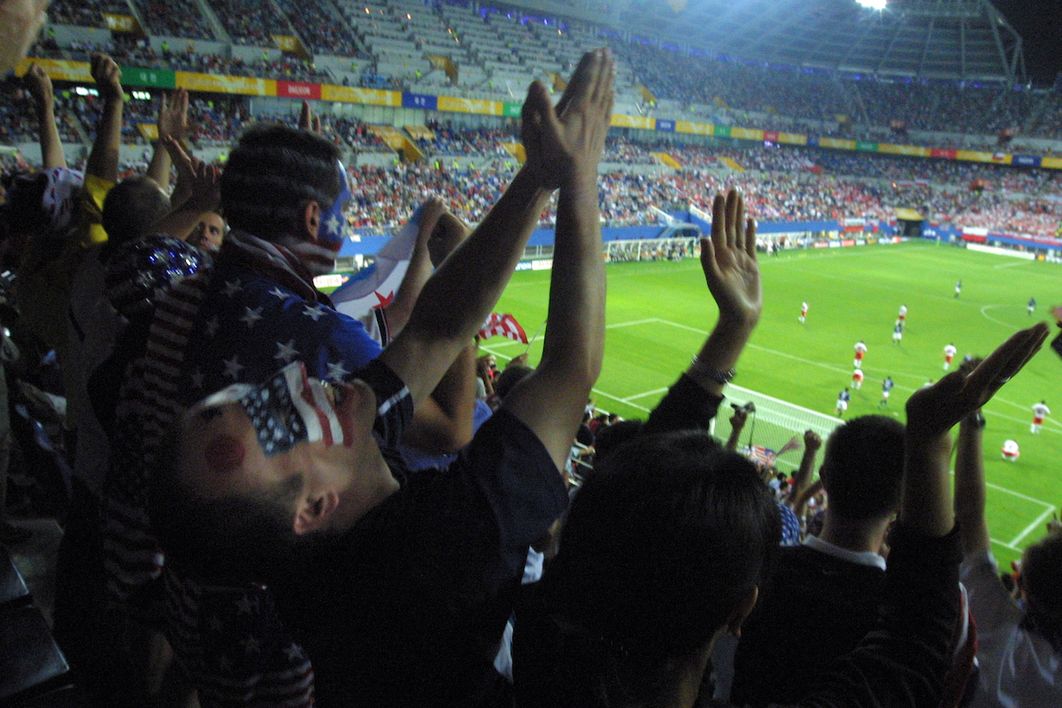
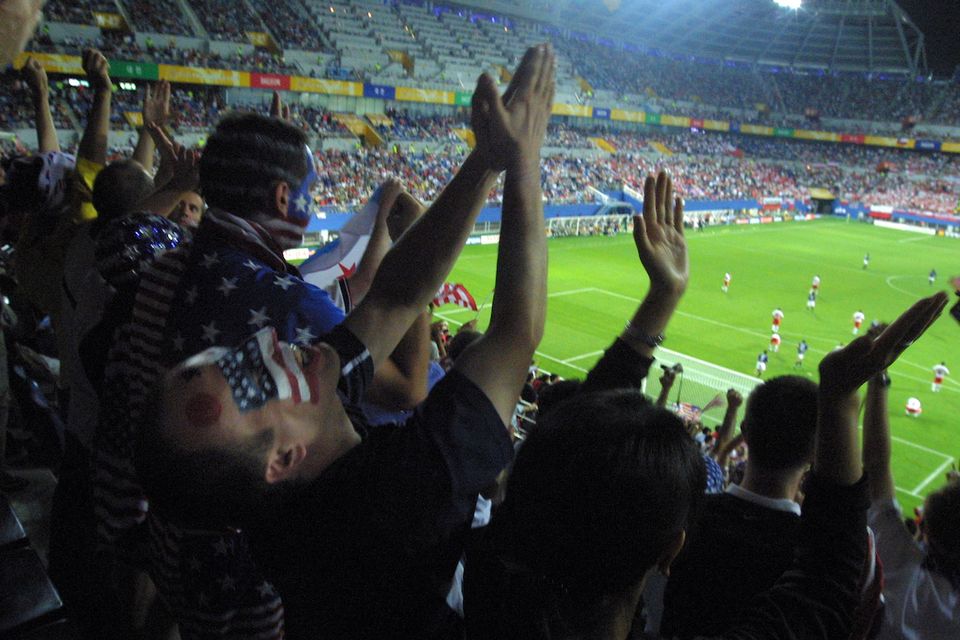
Those cheers were for Ji-sung Park, gave the Koreans a 1-0 lead in the 70th minute. They held on for the win and the USMNT moved on.
McBride said he was impressed with the “integrity that that South Korea showed by going out there and continuing to work to score that goal probably goes unnoticed because there's plenty of times where coaches just basically say, 'Hey, we're not going to extend ourselves. We are not going to attack. We're going to basically try and keep possession. Korea kept playing."
The U.S. survived to play another day with four points, thanks to the win and draw in its opening two matches. Korea (2-0-1, 7) won the group.
"It was a huge achievement," Reyna said. "No one would have predicted the U.S. and Korea to get out. Over the three games we deserved it."
The USA’s opponents in the Round of 16 was Mexico, which finished on top of Group G with a 2-0-1 record over Italy, Croatia and Ecuador, a day before the U.S. clinched its knockout round spot.
They said to bring it on.
"When you look at people from the outside, looking at it probably like wait a second, they finished top of their group," McBride said. "People were probably thinking wow, they're [the U.S.] probably going to be worried. That was nowhere near the truth. There was just this determination ... that showed from the second we stepped on the field. We knew how we were going to play with the game plan that Bruce had put together. We knew how we were to be able to break them down. Brad Friedel had a fantastic game also."
"It was not on anybody's mind that we were going home," Stewart added.
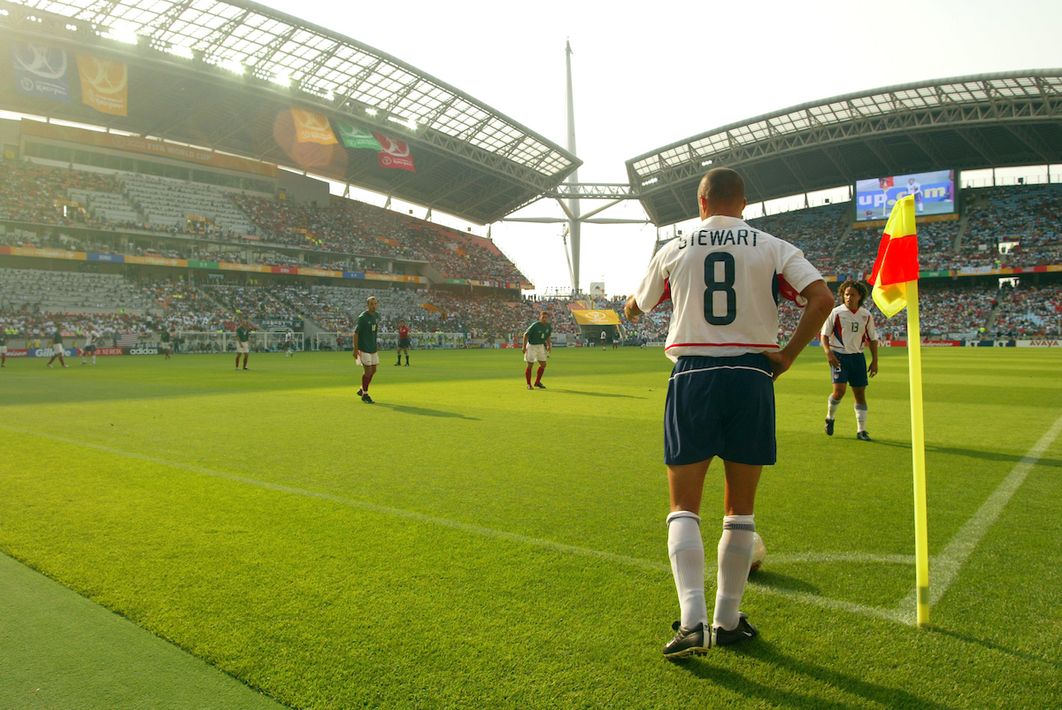
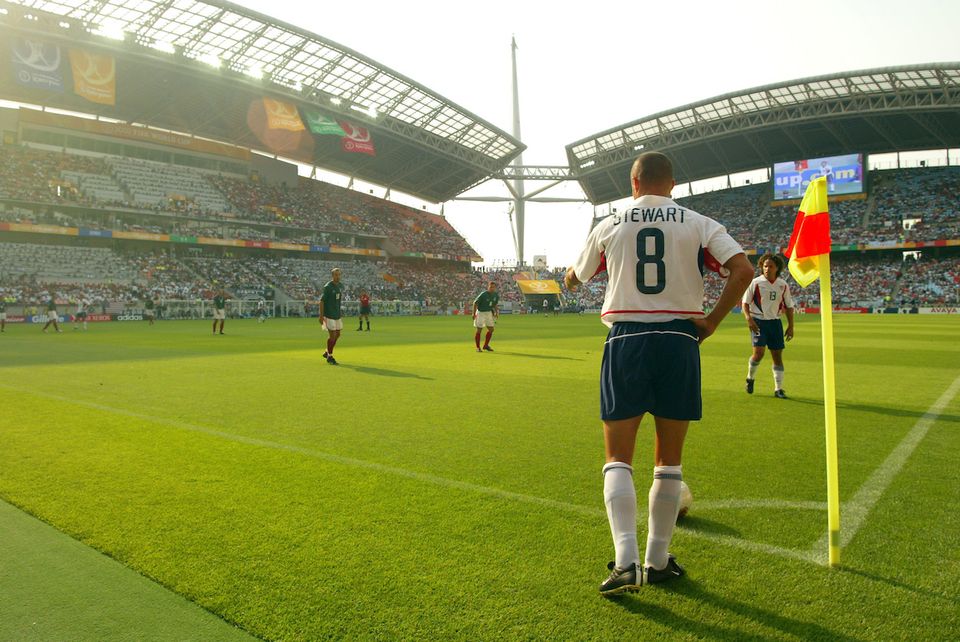
Translated: the USMNT had grown in performance and confidence.
"That was the best that we possibly get in the entire World Cup,” Pope said. "We knew them. We had recently had a lot of success against in some friendlies here and there. We were excited about drawing them. It wasn't because they were an easy team to beat. It was just that we felt like we could beat them. It was the opportunity to beat Mexico in a World Cup. Forget all the other matches. This was the ultimate."
Added Donovan: "We relished it. We were so excited for that game. It was just one of the best moments in my career."
Arena did not like the fact the USA had little time to recover. The Americans had only two rest days between the group and knockout stage.
"What was really challenging, we played Poland on a Friday and the Mexico game was on Monday," he said. "There was a quick turnaround. We lost a few players out of the Poland game."
Agoos was sidelined for the rest of the cup with an achilles tendon injury suffered against Poland. Beasley also was injured. Frankie Hejduk served a yellow-card suspension.
Before taking on their Concacaf rivals, President George W. Bush phoned the USMNT in Jeonju.
"The country is really proud of the team," Bush told the group. "A lot of people that don't know anything about soccer, like me, are all excited and pulling for you."
Arena promised Bush that the team would "give a performance that all America would be proud of."
But first, Arena needed to put together a viable Starting XI. He decided to revamp his formation from a 4-4-2 to a 3-5-2.
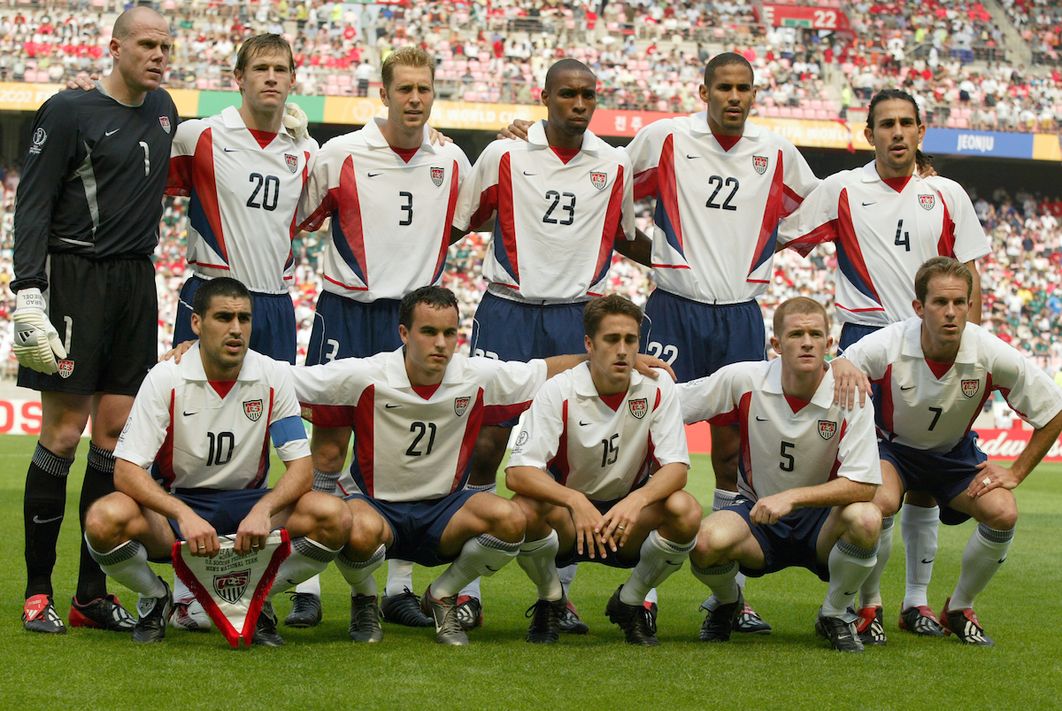
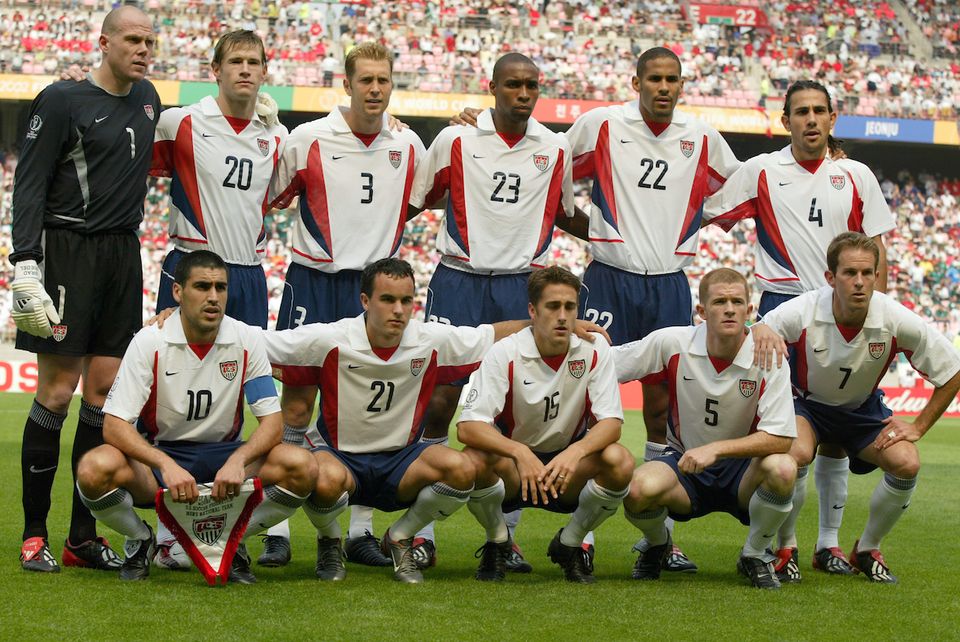
"We didn't care what the formation was, what it looked like, if the game was ugly or pretty or whatever," Donovan said. "We just were motivated to beat Mexico."
Unused during the group stage, Gregg Berhalter was inserted into a three-man backline that included Pope and Sanneh.
"As players you want to play, and that's the feeling that you should have," he said. "When I got the opportunity to play, I was excited. I wasn't looking backwards and saying, 'Ah, I didn't play.' I think that was the strength of the group. It was guys that like, 'Okay, my number was called. Great. And if it wasn't called, I'm there to support the team.’ Even though it's not easy on an individual level, the team is more important."
Pope knew Berhalter could handle going from zero to 60 against the USA's Concacaf archrivals.
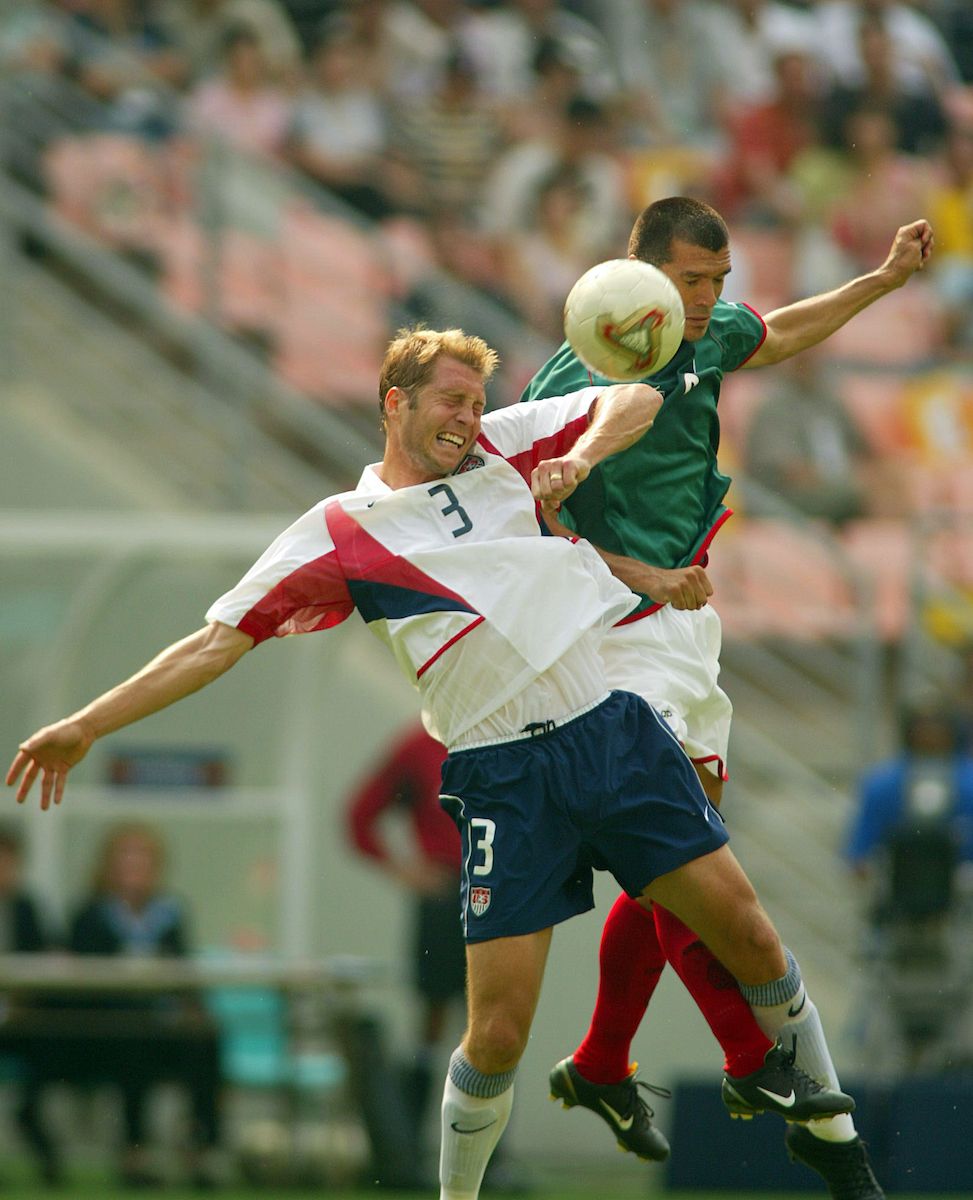
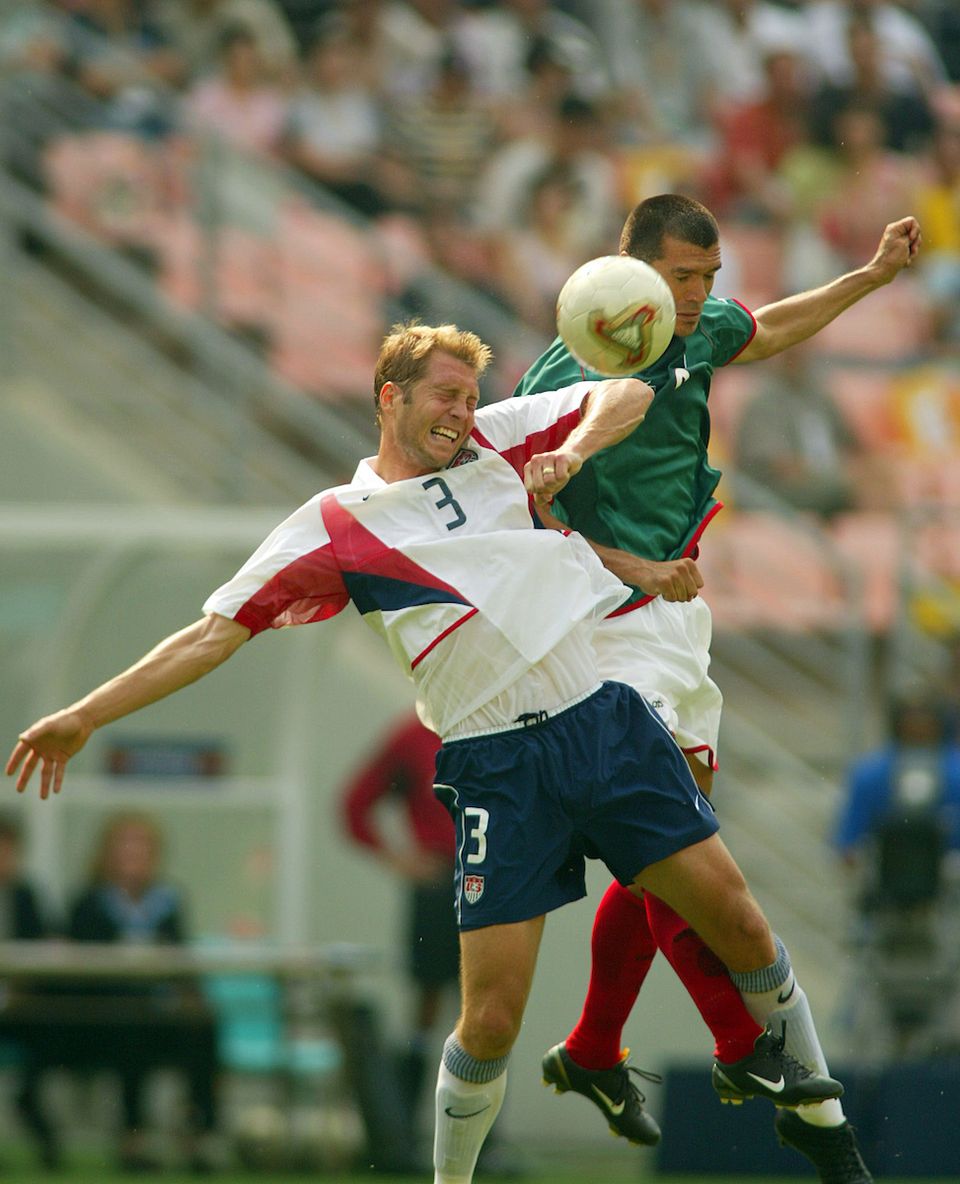
"Gregg’s just built for something like that," he said. "It was the perfect scenario for him getting thrown into the fire like that, because he's such a mentally strong individual. We have familiarity playing together. It was a good fit for me, a good fit for him."
As USMNT coach, Berhalter has brought that forward to his players today, knowing that everyone can make a contribution. He used that next man up philosophy during the 14-game World Cup Qualifying when he utilized 38 different, as well as using almost entirely different rosters as the USA won both the Concacaf Nations League and Gold Cup within two months last summer.
"I understand players want to be on the field," he said. "The first thing I know is that every player is a competitor. I know you want to be on the field. Unfortunately, we can only pick 11 players to start the game and we only have a certain amount of subs. If you’re not on the field, there are still expectations that we have on you. We expect you to be supporting the team. You don't have to be happy, but you have to be supporting the team. I just think it's communication because if you don't take the time to communicate, players can fill in the gaps with their own stories of why they're not playing."
That 3-5-2 formation was deployed once during qualifying, coming in the 1-0 win past Costa Rica in Kansas City in 2001.
El Tri, however, did not anticipate the switch.
"In their last group game against Italy, Mexico looked content to get the tie because they knew who they'd be playing," Berhalter said. “They were happy with the outcome of that game.
"I think we kicked off at 2 p.m., and it was hot. I remember saying to myself, ‘You're going have to just empty the tank. You can't leave any anything on the field if we want to be successful.’ It was about digging in and fighting."
Reyna, who usually played at central midfield, was deployed as a right wingback. Eddie Lewis, a midfielder, got his first start as a left wingback.
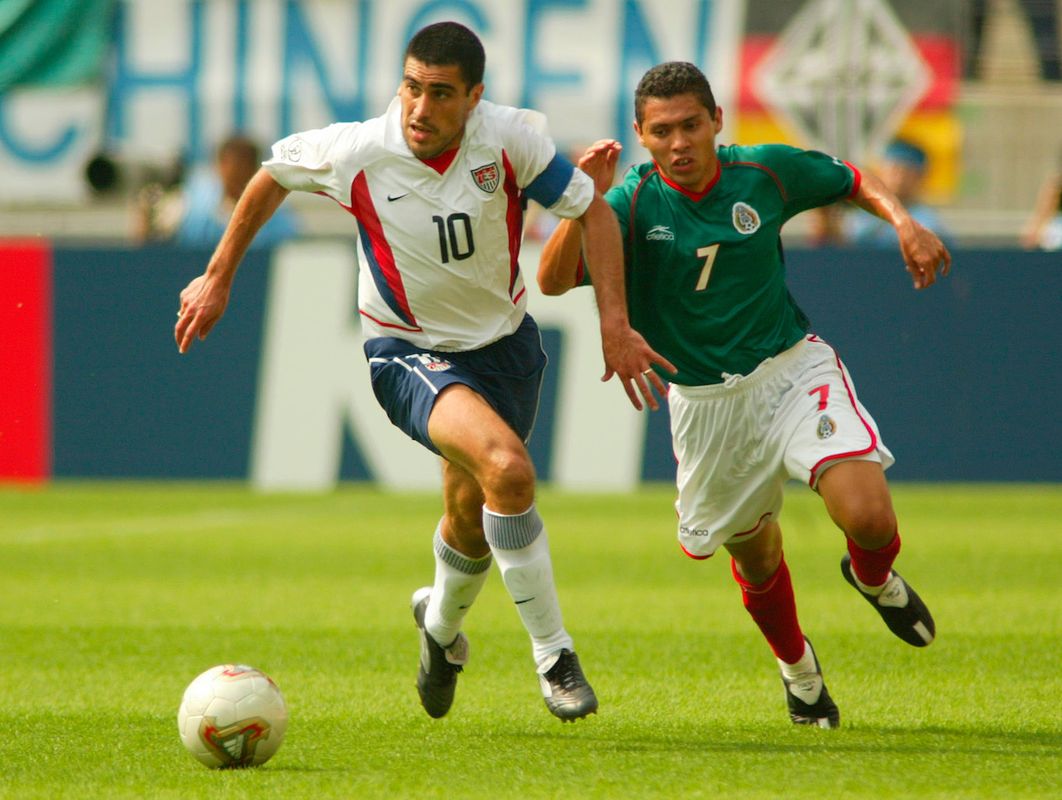
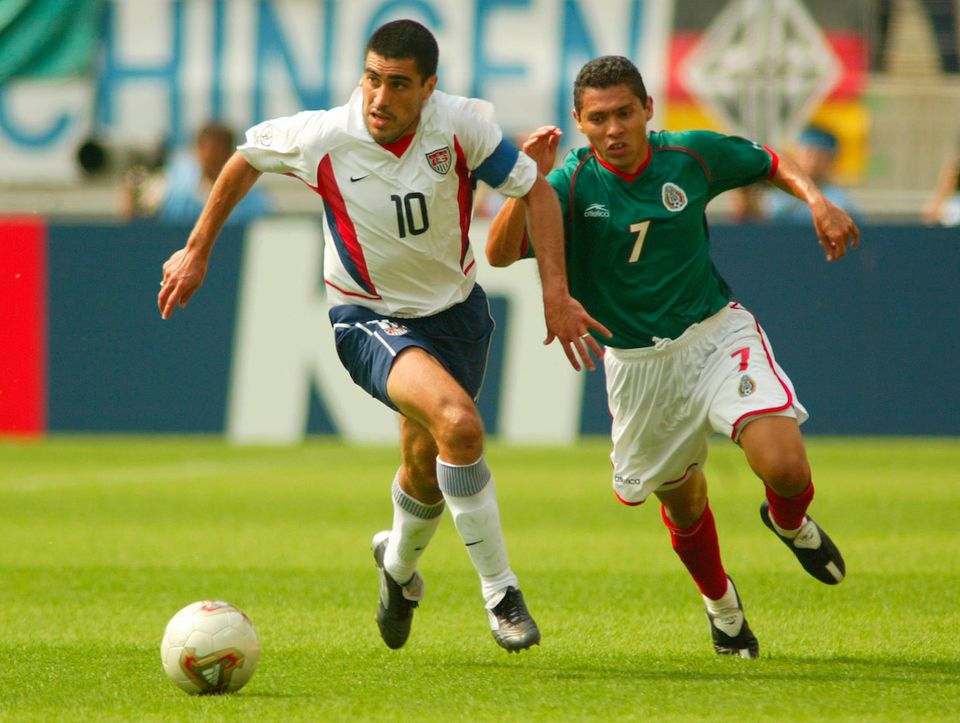
"That was totally fine, really," Reyna said. "Bruce talked to me about it. There was nobody bigger than the team. I did have a lot of experience playing in that role at Rangers at right back. Rangers, we were always offensive and had the ball. So, I was pretty much playing like a right midfielder wing back. I wasn't nervous about it at all."
Neither was anyone else.
"It's a good example of being able to be flexible as players," Reyna said. "Sometimes you'll hear people talk about, 'Oh, you change the lineups and the formation, and it makes it difficult.' Well, there wasn't one player who doubted what we were doing in our approach going into that game. We believed in ourselves. If this was the way we're going to get a result, then everyone was on board."
Pablo Mastroeni and O'Brien paired as the central midfielders.
"I think that what Bruce did is give us belief," Berhalter said. "We weren't focused on what we couldn't do. We're focused on what we could do. He pieced it together in a really clever way. That gave the team confidence."
"It highlights the closeness of the group," McBride said. "There was always a feeling that all 23 players were a part of any accomplishment that we would achieve."
It didn't take very long for the Americans to draw first blood after McBride was fouled in the eighth minute.
"Typically, we just push everybody up and we'll play a long ball into the penalty area and try to either score directly or on second balls," he said. "As I'm getting up, Claudio was screaming for the ball. 'Play me! Play me!' I put the ball down and played Claudio. He's just full pace running down the wing. Gets close to the end line. Josh Wolff had made a run past the near post. Claudio crossed the ball in. I was just making it in the penalty area. Josh sees me coming to the top of the penalty area and lays off the most perfect pass in the spot where I could hit it the first time.
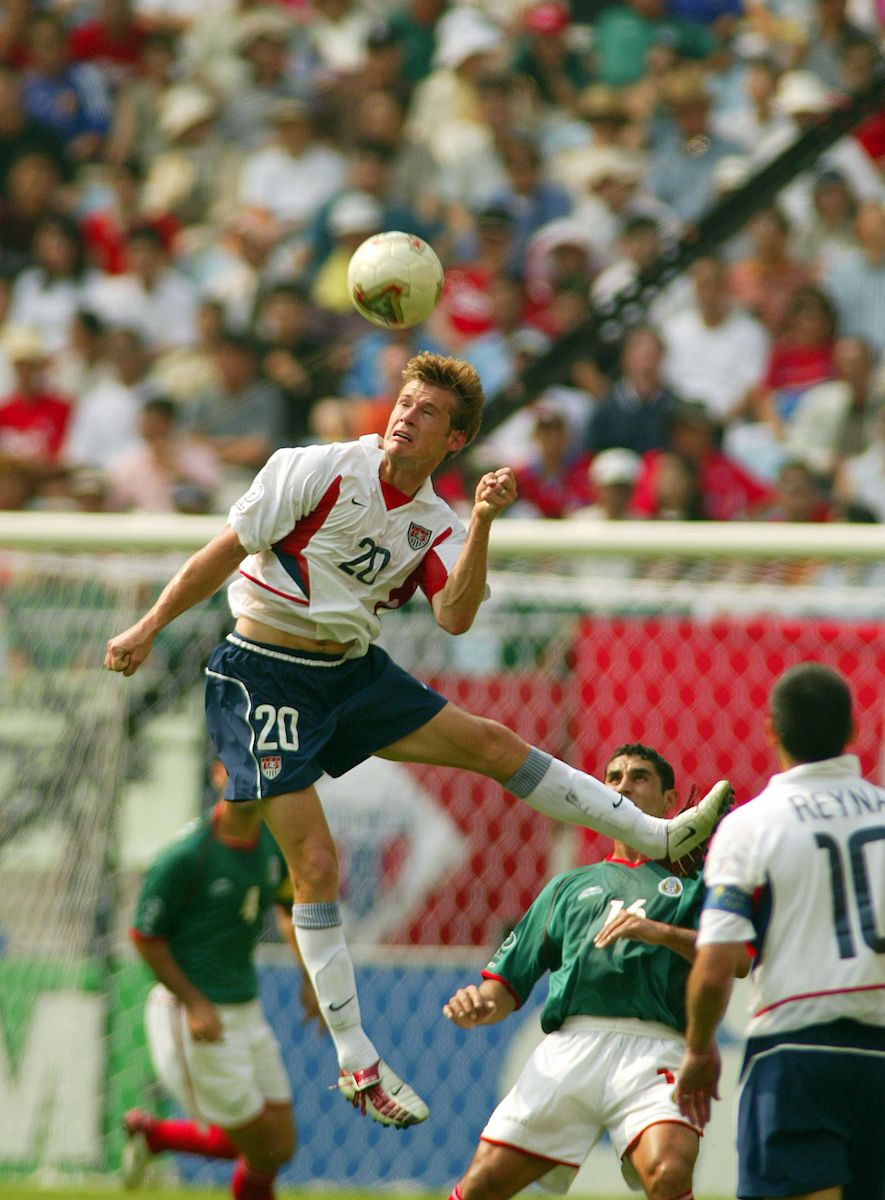
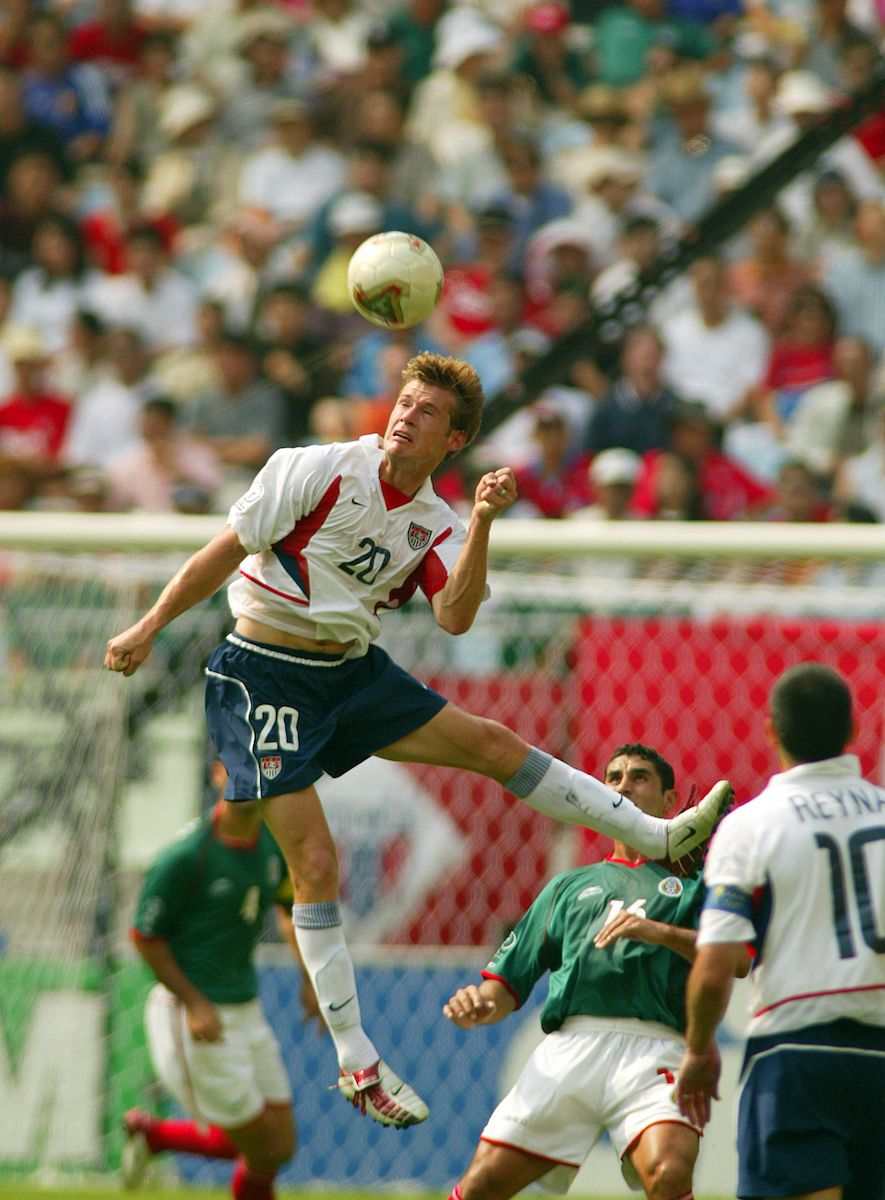
"It was like it was slow motion. It gave me the time to look and see where the goalie was. All I had to do was keep it down and it would go in. After it did, it was the only time I can remember jumping into someone's arms," he added with a chuckle. "The funny thing was, Claudio was actually jumping into my arms in one of the most awkward celebrations. But one I'll never forget."
Mexico probably will never forget what transpired in the 57th minute when referee Vitor Melo Pereira did not see O'Brien punch the ball away out of danger on a corner kick. They complained, but there was no call.
In the 65th minute, Donovan finally had an opportunity to celebrate a World Cup goal. Catching Mexico in transition, O’Brien, on the left flank, passed to Lewis. The left wing back crossed to Donovan who headed it past goalkeeper Oscar Perez from six yards.
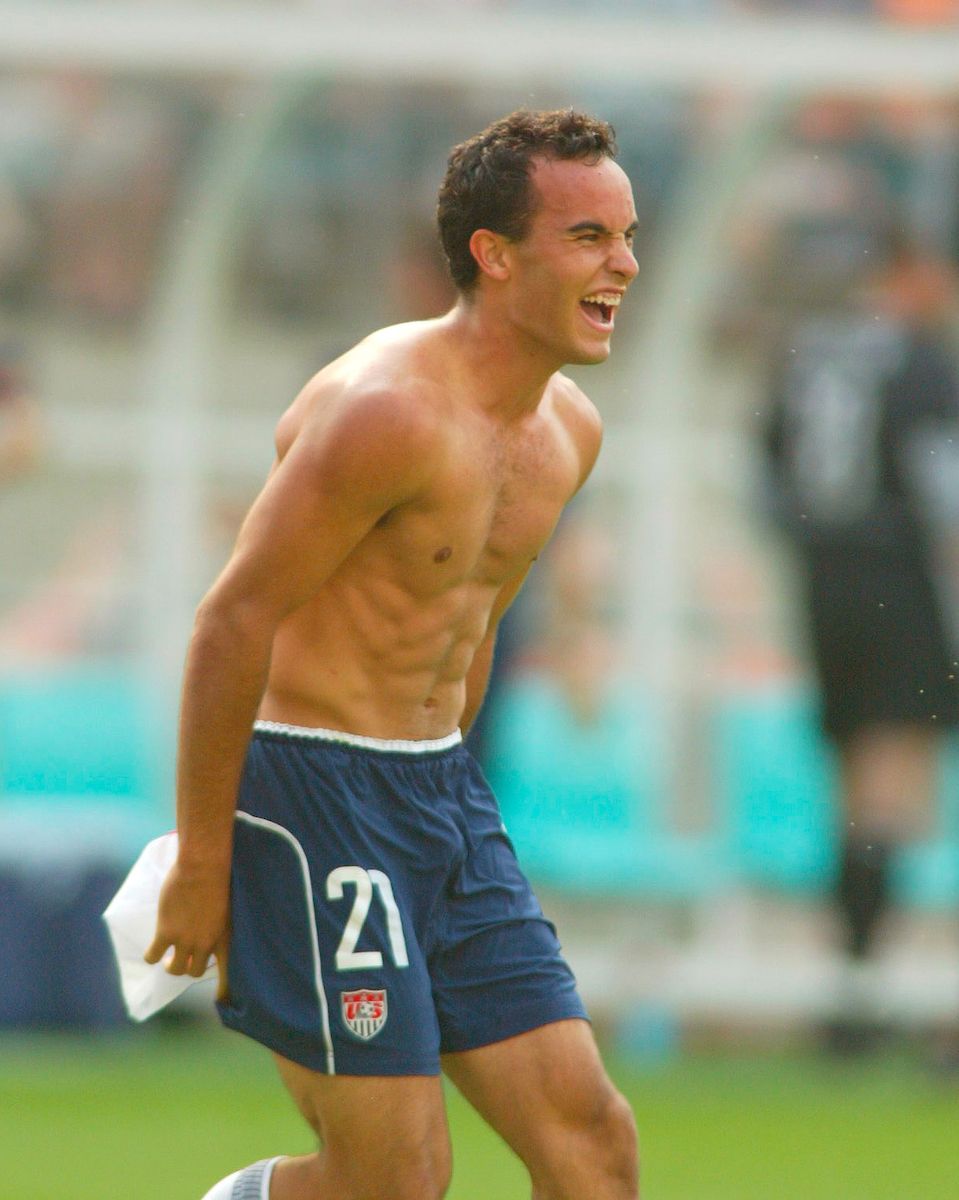
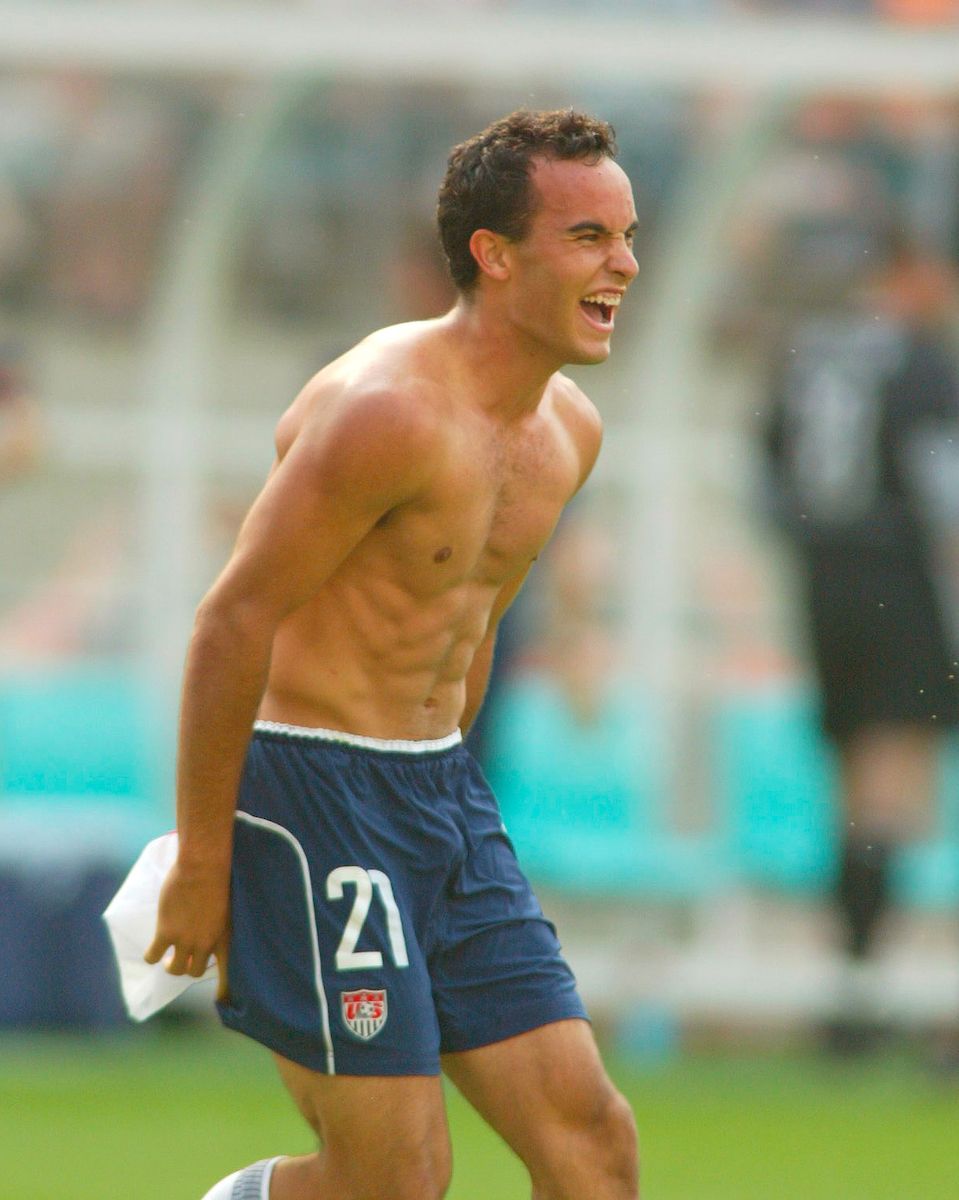
"I was growing into the tournament personally," Donovan said. "At this point, I was confident that I could play at this level. Going into the tournament, I was like, ‘Am I good enough to play at this level?’ I don't know. I felt better and better every game.
"The one thing that we were, if nothing else in that tournament, was really fit. It was the fittest I've ever been in my life, the strongest I've ever been in my life. On that goal, I ran probably 60 yards on a really hot, humid day. But it was seamless for me because I was in such great shape. Getting on the end of that cross was the hard part. The actual scoring of it was very easy. It's an easy header but getting there was the part that that made the difference."
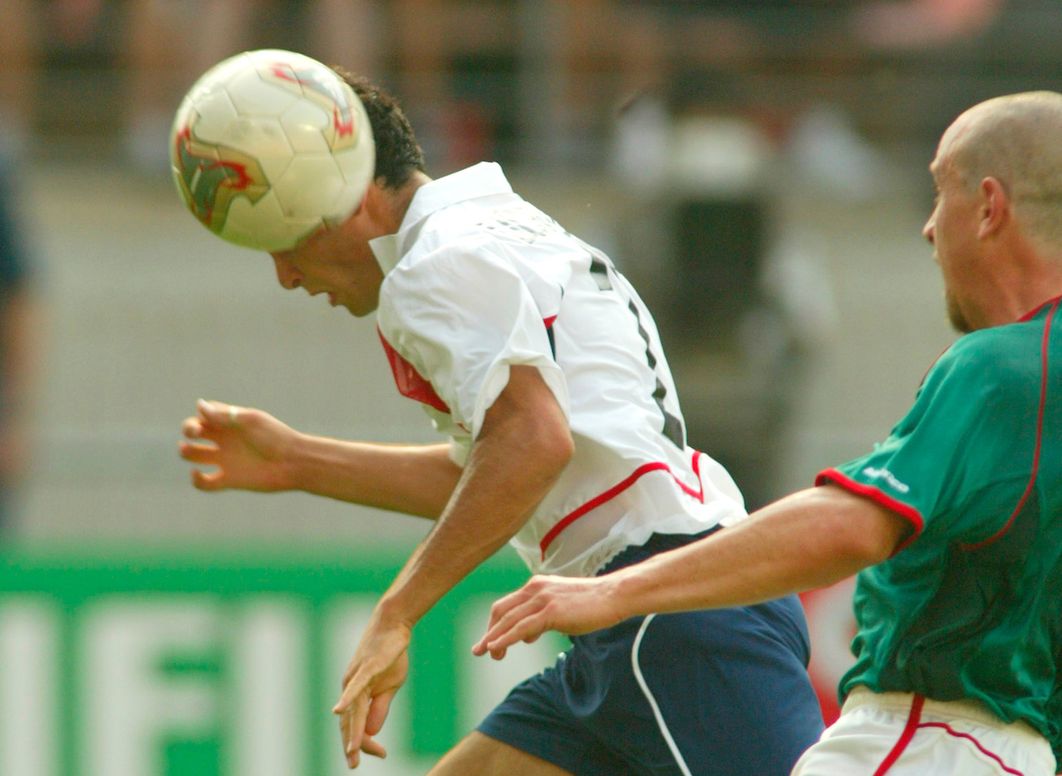
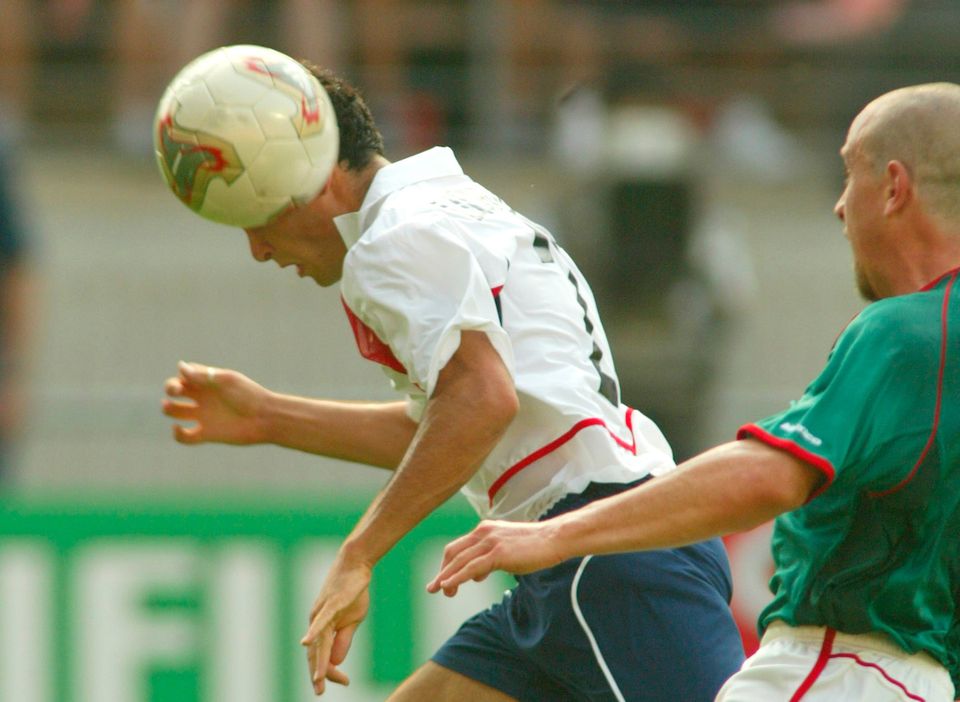
Clearly frustrated, Mexico became more physical.
Rafa Marquez, who had several incidents with U.S. players through the years, head butted Cobi Jones in the 80th minute and was red carded.
"Mexico got to a certain point where they just said, ‘We’re going to take as many with us as we can with some fouls,' that were blatant fouls," McBride said. “Everybody keeping their head and not retaliating took a lot of strength and determination. The guys handled it really well. And then it was just pure joy."
Final score: 2-0. The greatest “Dos a Cero” result ever.
"Nobody was surprised," Stewart said. "The team was extremely confident going into this game; something that I had not even experienced before. It was almost logical that we won the game. That win against Portugal really gave a lot of players the confidence that we could actually win these types of games."
The USA was motivated to prove the first “Dos a Cero” result in 2001 wasn’t a fluke.
"That was arguably bigger than the one in Columbus because Mexico always prided themselves on never being beaten at home or in a neutral venue by us," Friedel said. "They claim the only way that we could beat them at home was by taking them to the elements like we did. I don't think anyone that watches the game thought that we got lucky. I don't think anyone that watched the game thought the second-best team won. We were better from start to finish. We wanted it more. ... You saw by their reactions at the end of the game. They couldn't deal with it mentally."
The USMNT’s present for ousting Mexico?
Germany in the quarterfinals.
The USA had dropped its 1998 World Cup opener to the Germans, 2-0, in France in a match the European side dominated.
The 2002 edition might have been an aging German side, but the team always knew how to win and traditionally went deep in the World Cup. Germany captured the 1954, 1974 and 1990 competitions (it became the first European team to win a World Cup in South America, Brazil, in 2014).
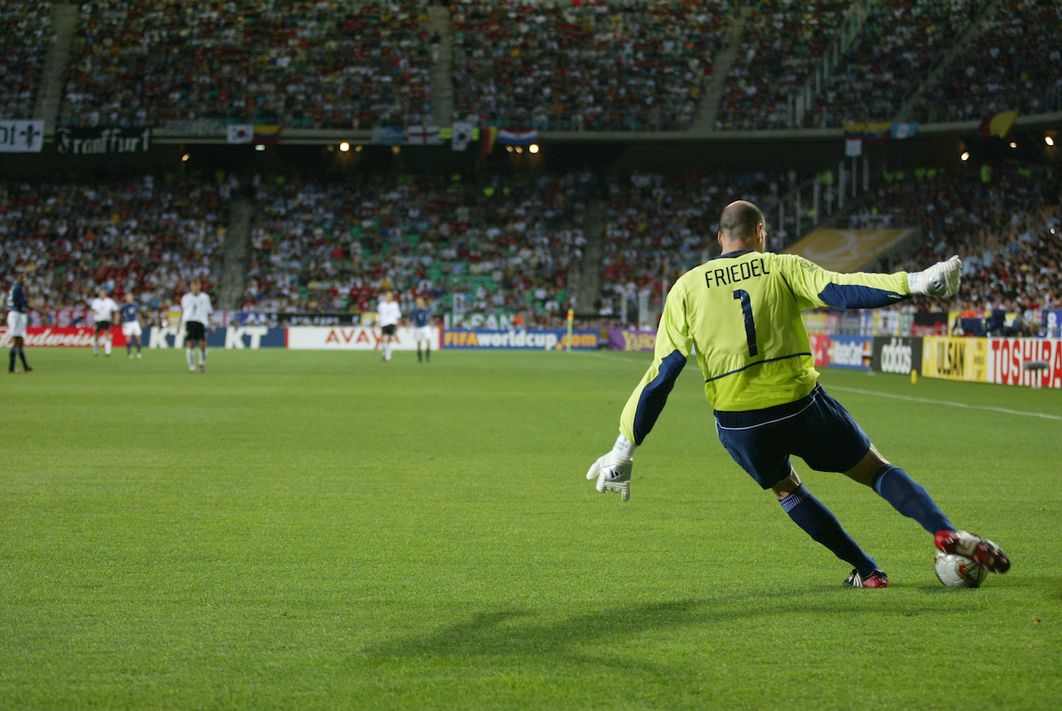
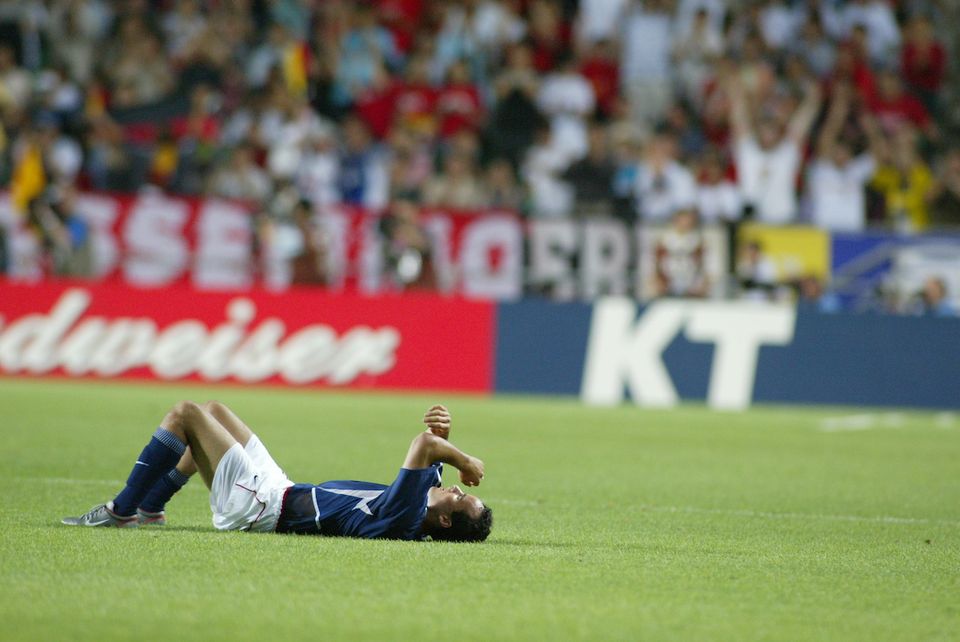
"You always know Germany's going to be extremely good," McBride said "But we went into that game with the same mentality. We have to believe that we win the match. We didn't sit back. We were very organized. We had to try and hit them on the counter and really be direct going forward as possible."
"Germany is one of the giants in the history of the World Cup," added Reyna, who once played for Bundesliga sides Bayer Leverkusen and Wolfsburg. "I was extra motivated to have the bragging rights of knocking them out."
Goalkeeper Oliver Kahn, who made some outstanding saves, and Michael Ballack, however, would have something to say about that at Munsu Cup Stadium in Ulsan on June 21.
"Defensively, we were really good," McBride said. "Brad played really well again. With a bit of fortune, it could have been a different result."
The Germans found the net in the 39th minute. Christian Ziege attempted a free kick some 35 yards on the right side. Ballack jumped between Sanneh and Berhalter and headed the ball past Friedel.
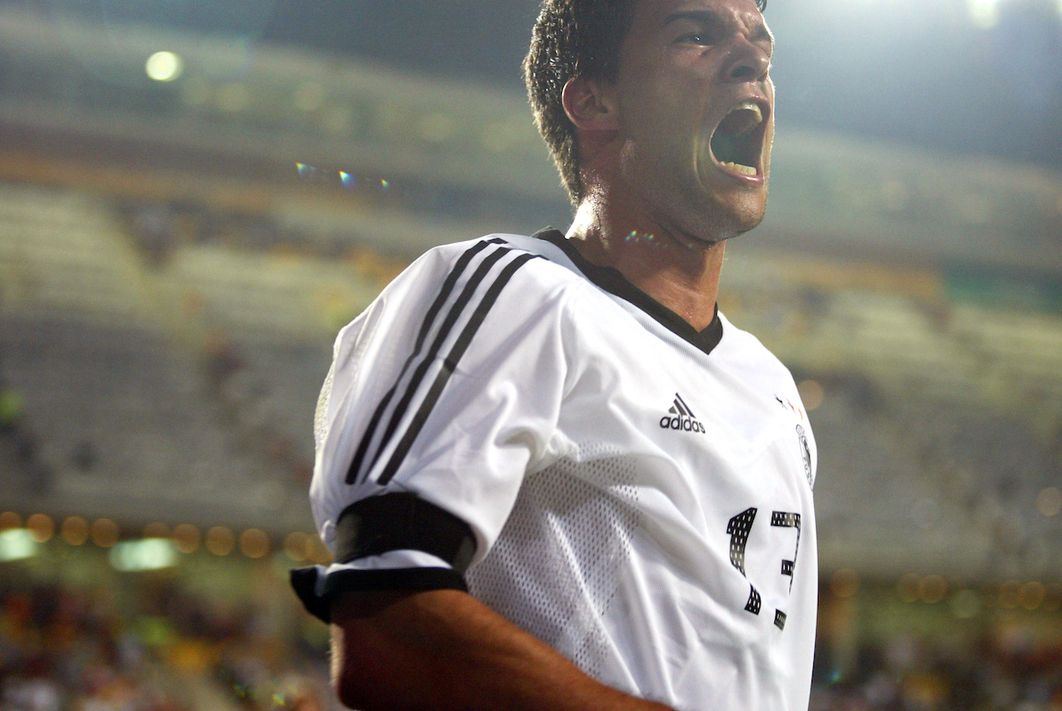
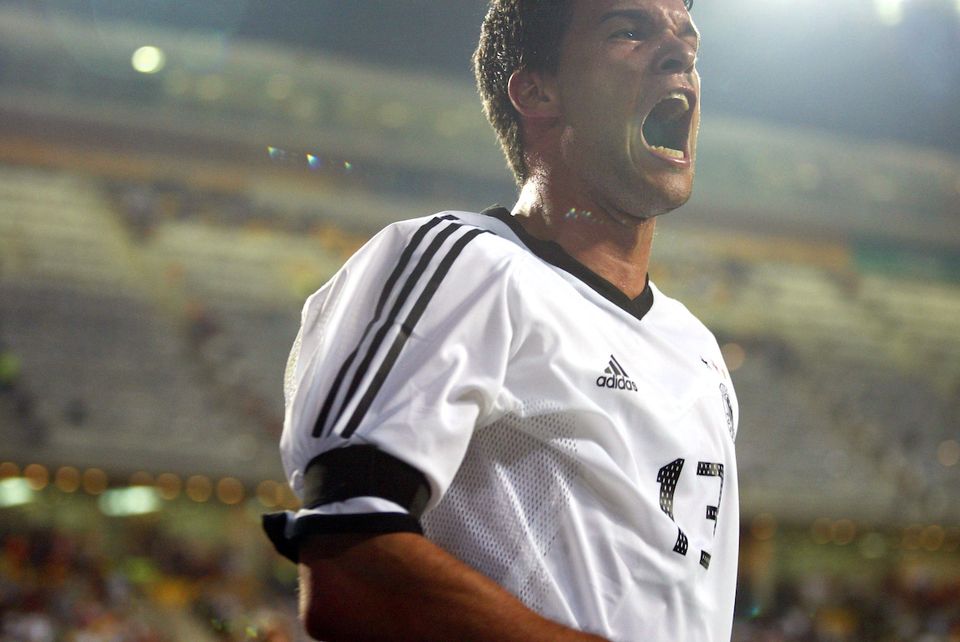
The Americans never stopped attacking. Donovan created two opportunities for himself, faking two defenders and drilling a shot that Kahn barely got a hand on. On the half hour, Donovan had another chance, but Kahn tipped it wide again.
Four minutes into the second half, the U.S. had its best opportunity. Reyna’s floated corner kick found Berhalter whose mid-air volley was blocked by Kahn. The rebound hit the outstretched arm of German defender Torsten Frings on the goal line.
The Americans shouted for a handball.
Referee Hugh Dallas didn’t see it and play continued.
"Where was VAR?" Pope said with a chuckle about Video Assistant Referee, which would not be used until years later.
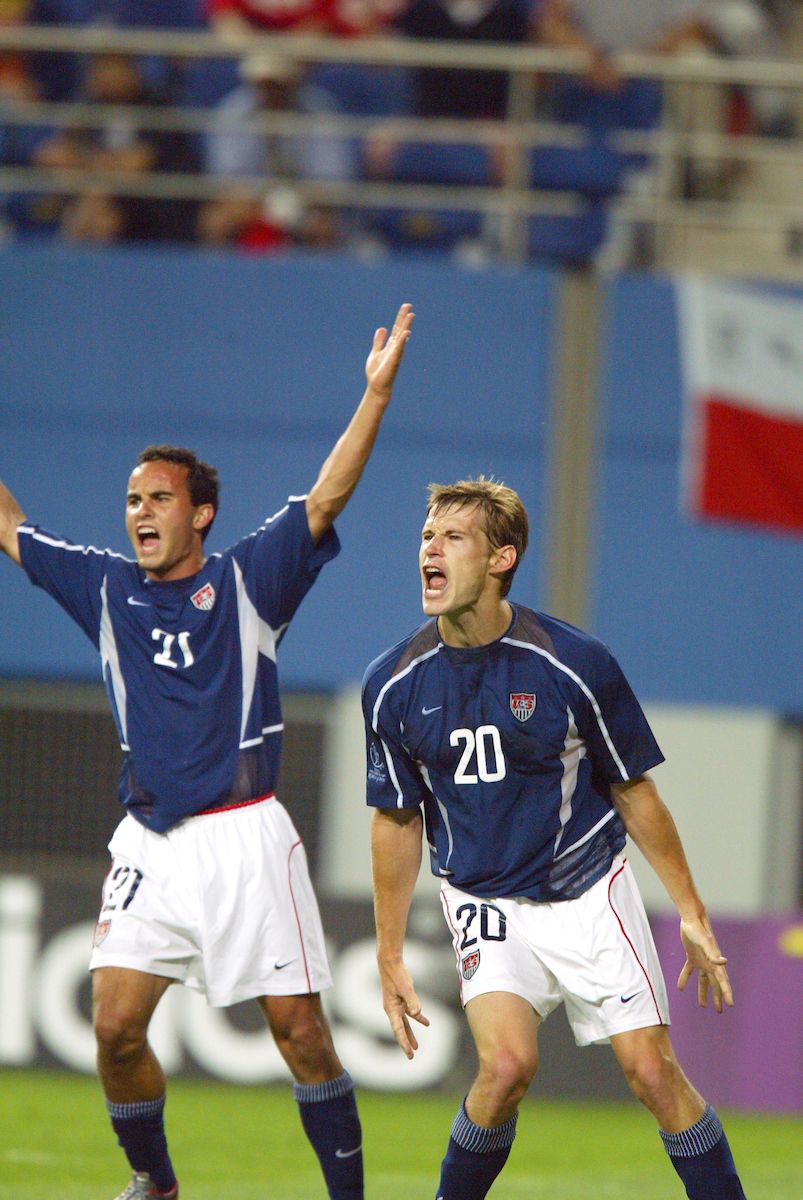
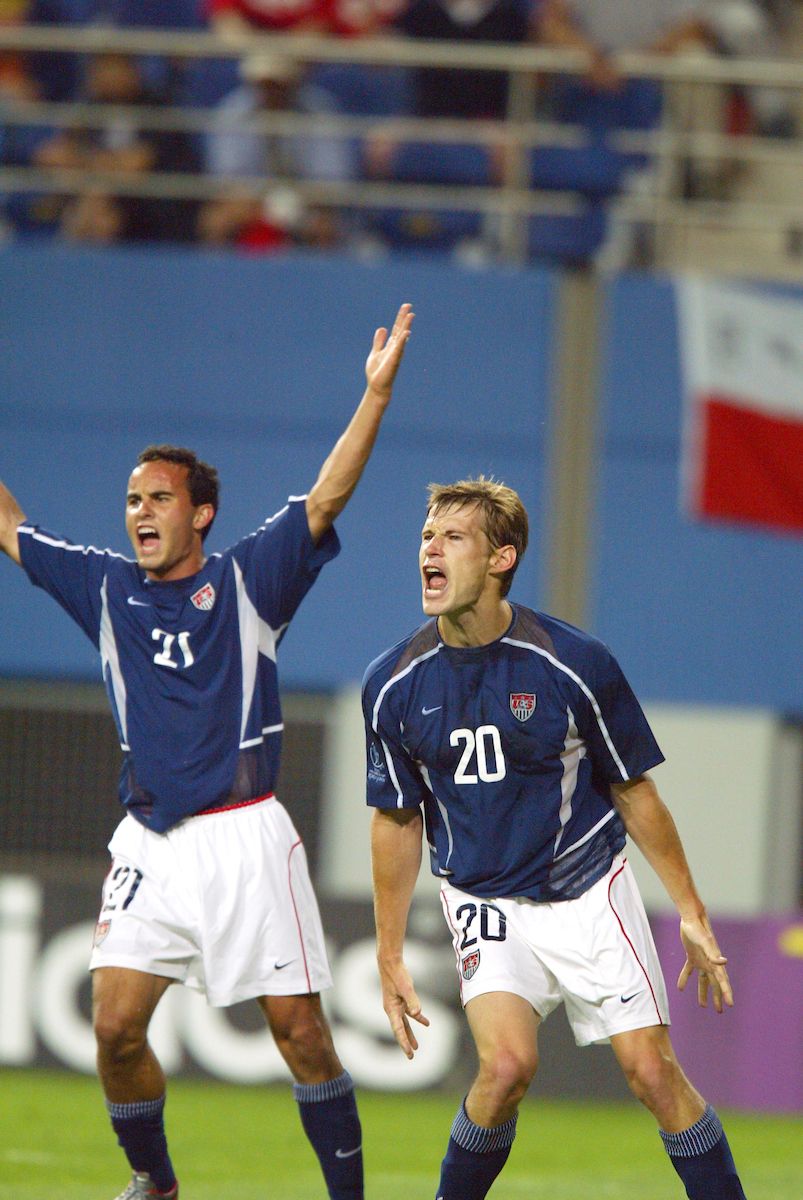
That could have been a red card and a penalty kick, which would have changed the course of the game.
"I had the feeling that, and this is just conjecture. I have no proof on this," Berhalter said. "I had the feeling that the referee didn't want us to go to the next round. He was a Scottish referee, and I just had the feeling that he knows the place of football in the world, and he couldn't bear to see Germany getting knocked out by the United States. He was really aggressive the whole game against us. This call, it's hard to understand how he doesn't see it, especially with having an AR, a fourth official. It's unfortunate. We deserved more."
Arena added: "It was a 100 percent penalty. I hate to say we were cheated out of it. ... We had the momentum in the game. We controlled the game. We would have beaten Germany and gone on to the semifinals. One of my conclusions out of that is that we still as a country had not earned the respect of the world."
The USA continued to push for the equalizer. In second-half stoppage time, Mathis sent in a cross that Sanneh headed and hit the outside of the net.
When Dallas blew the final whistle minutes later, the Americans walked off the field with mixed emotions.
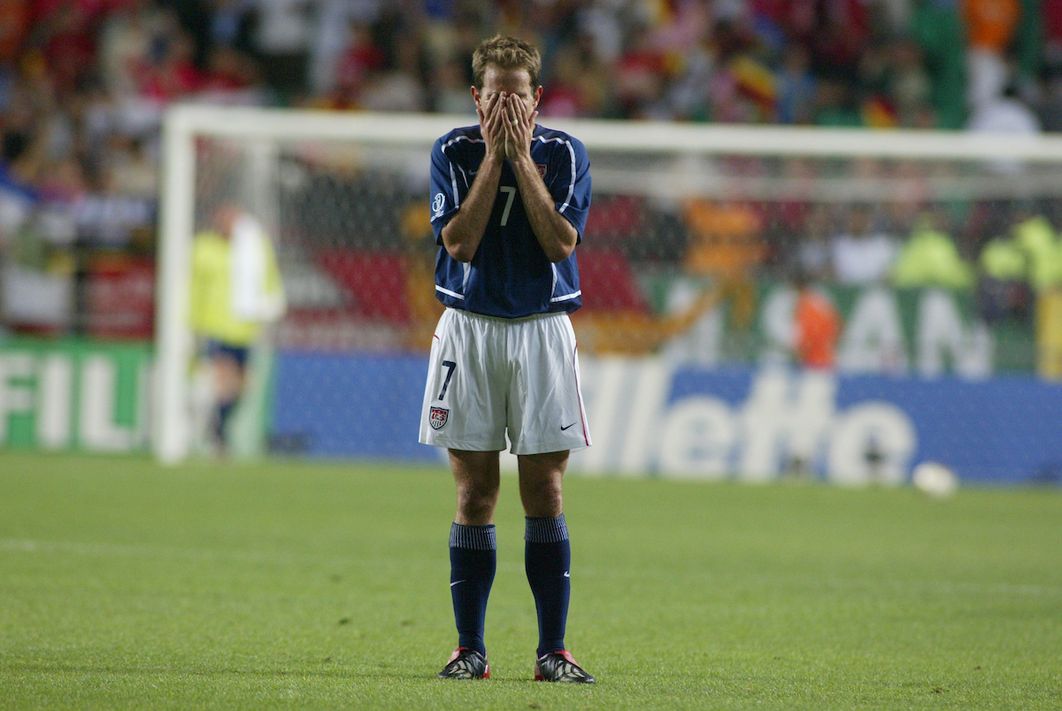
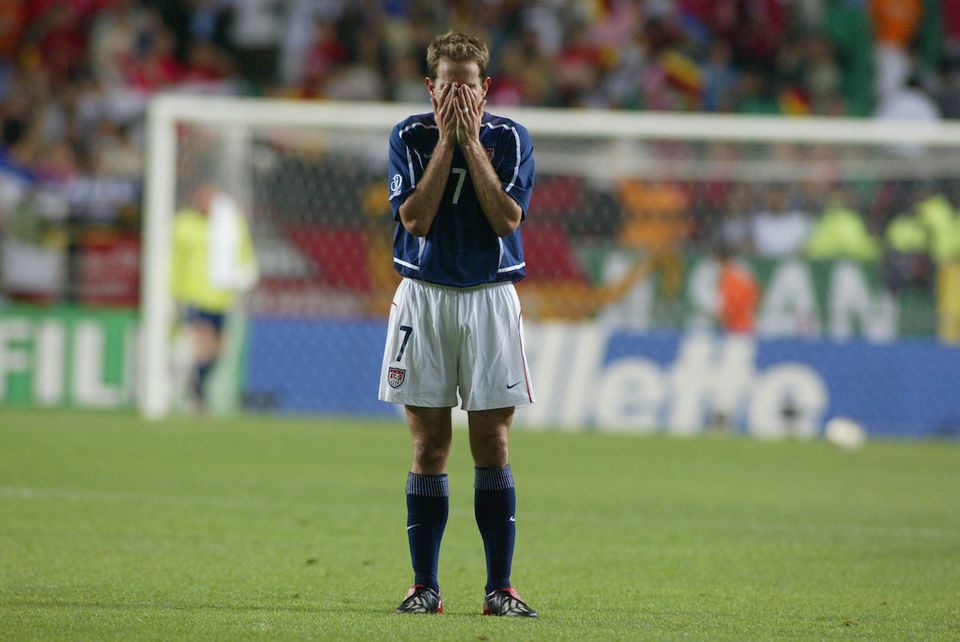
"It was disappointing," Stewart said. "It doesn't really matter who you play. In ‘94, we went against Brazil, and we lost against the world champion in the second round and then lose against Germany in the quarterfinals. It's always going to be a disappointment, no matter who you're playing in a World Cup. Even though it's logical that top teams win at times, and that the underdog doesn't. Sometimes you won't get what you deserve.
"We could also be proud of that World Cup, certainly in relation to ‘98. The steps that were taken over those four years to where it was and where we stood at that time, it was a pretty good step in the right direction."
"It wasn't that we were sad, but we're proud of ourselves and how we played basically every game except for Poland," McBride said.


"It's one of those games when you walk off the field and you're extremely disappointed that it's over," Berhalter said. "But you're also really proud and you don't always have that moment. You can play poorly and lose and get dominated. We went out the best possible way. We pushed them to the absolute limit. If it wasn't for some heroics of Oliver Kahn or some bad officiating, we would have been on the board a number of times in that game. We didn't give up a ton. We made ourselves but also the country proud.”
Reyna noted that Kahn was the man of the match, "which explains so much about the game."
"After the game Franz Beckenbauer [German World Cup TV analyst] saying, 'We were very, very lucky to win, the U.S. was better and they deserved to win,' " he continued. "That was really the sentiment in the media after that.
"It gave everybody a good sense of hope of the future of the national team. If we could play against someone like Germany, I think everybody felt we're moving in a good direction, especially after France ‘98. It was just such a positive way to go out of a tournament. Sometimes you go out in a really bad way, unsportsmanlike behavior. We went out with our heads held high."
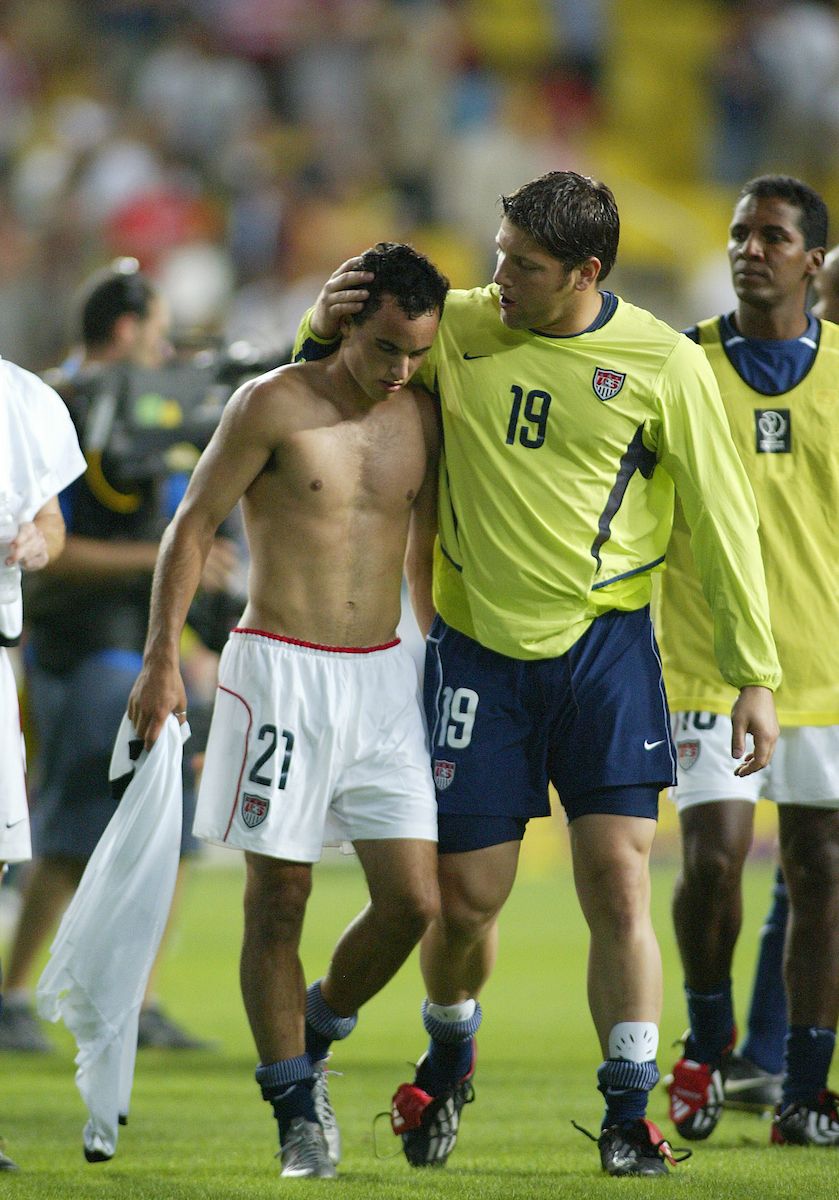
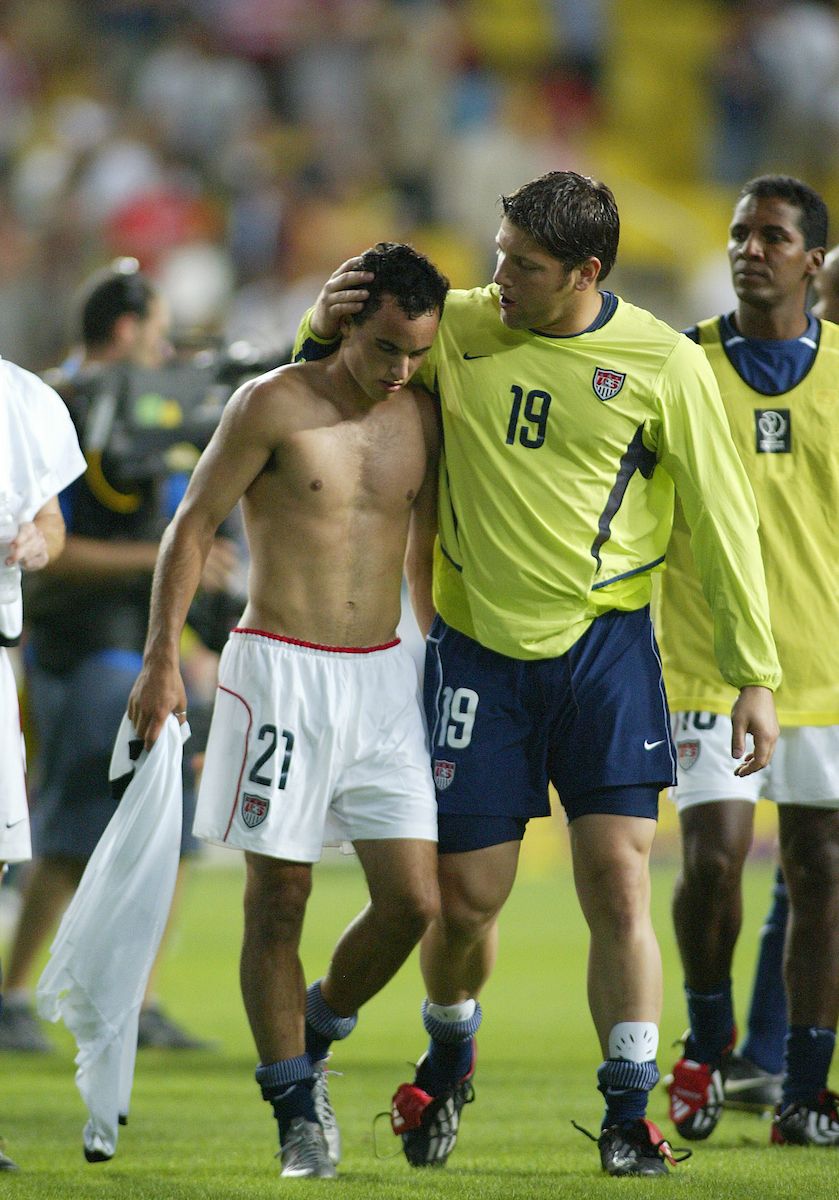
"The irony is that was the best game we played in the whole tournament," Donovan said. "We were really good that day. I should have scored a couple goals. It was frustrating. But there was an immense sense of pride from our guys, especially on the back of what had happened in ‘98. We really represented ourselves well. We were disappointed in the moments after the whistle blew, but I think we all held our head high because … we were the better team on the day."
"What I remember most about it is that we made it to the quarterfinals, and we weren't happy," Friedel said. "We didn't have players who were just happy to make the squad. We had players that expected to make the squad and then not be happy if they weren't starting. I think the same goes for that game. We didn't think of it as, ‘Wow, we got to the quarterfinals. We thought of it as, ‘We really should be in the semifinals, and we can't believe we're going home.’ "
Four Americans were selected for consideration for the World Cup all-star team. McBride, Friedel, Reyna and Donovan were among 53 players chosen by the FIFA technical study group. Reyna was the lone U.S. player picked, the first USMNT player to be so honored.
"It was a big deal," Reyna said. "I only made it because the team made it that far as well. It was part of the overall success of the group that I was recognized. It was amazing"
Donovan was named the young player of the tournament.
"I would say a nice consolation prize," Donovan said. "Awards like that are always subjective. You take it with a grain of salt. But of course, there's worse things as the best young player in the tournament. I was proud of it. I was proud to be part of a group that had pushed the limits in our country for the first time since 1930 and proud of what we were able to accomplish. I was a little bit of a benefactor, just being around a really mature group of guys who helped me grow a lot."
"Landon showed that he was a world class player," Arena said.
World Cup fever had caught on back in the USA. Depending on where they resided, fans got up early or stayed up late to watch games. For the Germany confrontation, for example, more than 7,500 people watched the match on large screens inside and outside of Columbus Crew Stadium.
That was just one venue.
"I remember going back to the Premier League and my profile changed just from your colleagues' level of respect," Reyna said. "I remember so many games in the first half of that season, there was one player who'd come up and say, 'Man, your run in the World Cup, that was amazing.' There's so much respect amongst professionals. It was pretty cool because it was me as an American in the Premier League. Players wanted to trade jerseys with me. It was crazy that was happening. Winning respect back after '98. That was a success for us because we were taken seriously."
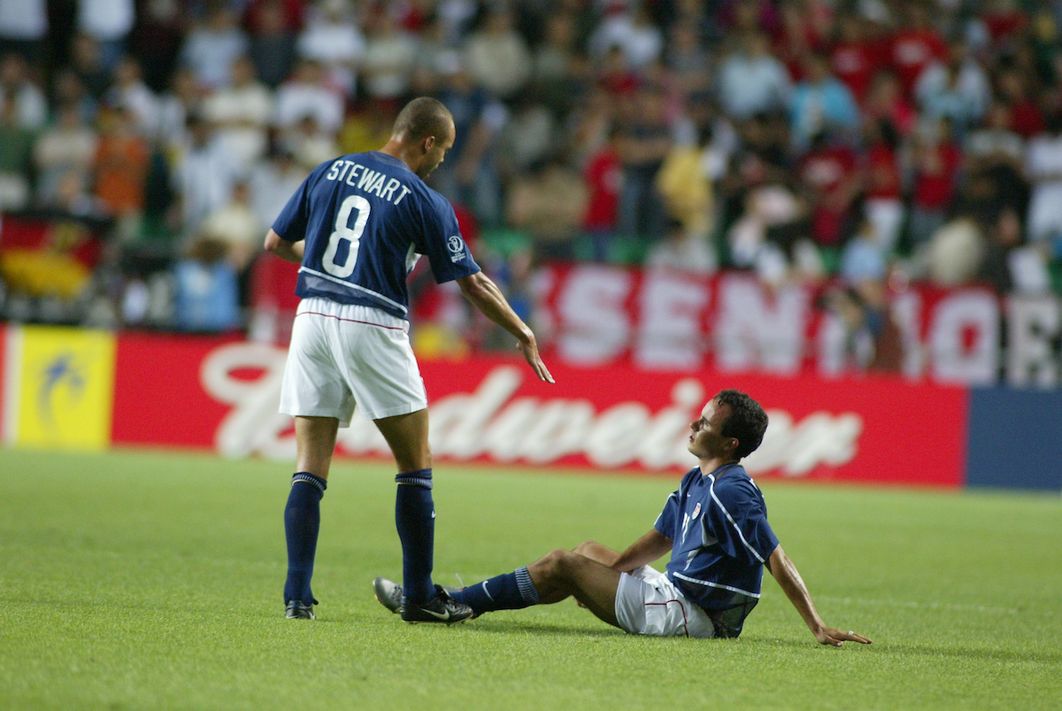
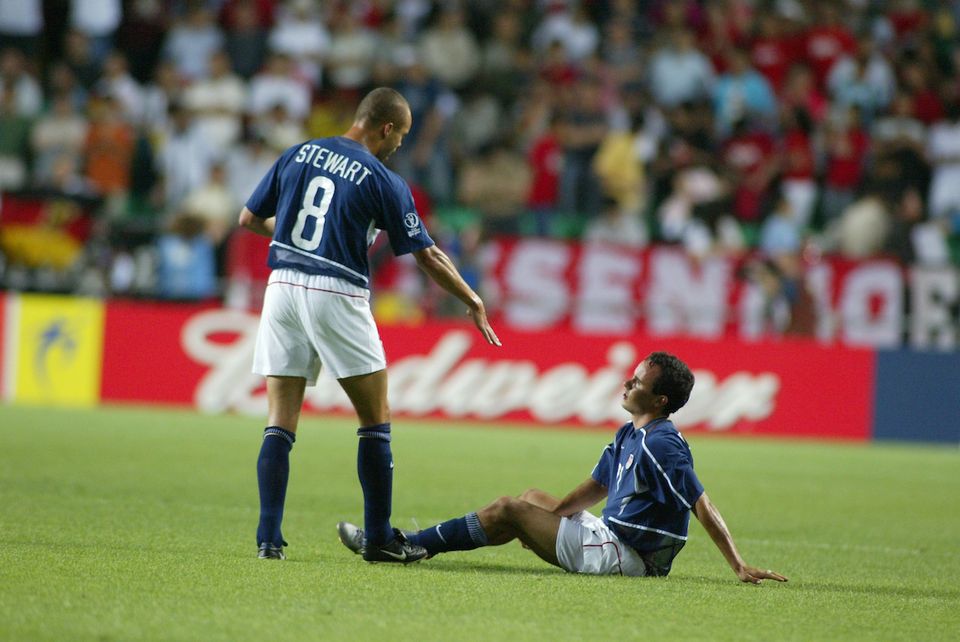
The players weren't just playing for themselves or the country. They also were playing for MLS. After the 2001 season, the league contracted from 12 to 10 teams and there were serious concerns whether it would survive.
"Going there losing three games, I think that would have hurt MLS," Pope said. "It's hard to say, but I don't think that would have been good. We got some publicity. We were on ABC. It was something that people stayed up for. Kids were up. It was one of the first times you started to see the U.S. Men's National Team jersey being worn around in different places.
"It played a small role. Just helping even defending us against the narrative that soccer in America, it's not going to catch on. Having two not so great World Cups would not have been a good thing."
Added McBride: "There was a deeper respect. That the whole thing was beneficial to the players, for U.S. players moving around the world, having more opportunities."
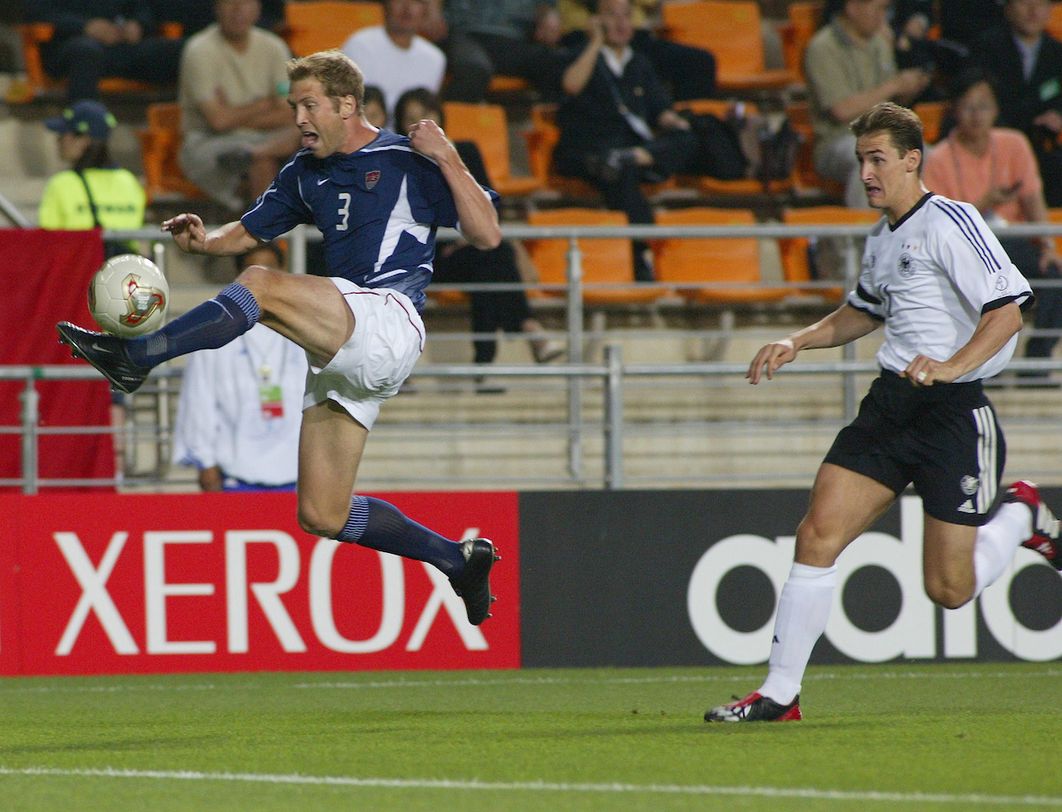
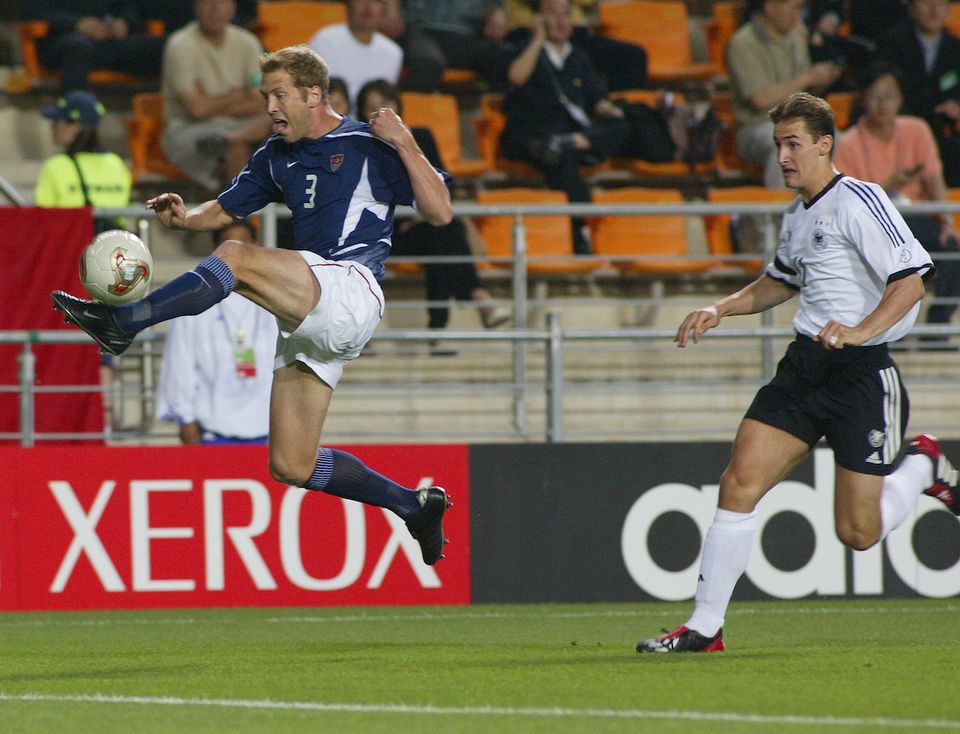
For example, a door opened for Berhalter, who transferred from Crystal Palace (England) to Energie Cottbus (Germany), “based on my performance against Germany in the World Cup," he said.
"When I went to Germany, they were very complimentary of our team and what we did,” he added. “It also helped at home. We came back and we were heroes."
Berhalter wound up going on Late Night with David Letterman TV show.
"People in the streets in New York recognized me," he said. "What is going on?"
Three members of the 2002 team - Berhalter (head coach), Stewart (U.S. Soccer sporting director) and McBride (USMNT general manager) - are key decision makers in U.S. Soccer.
They were asked what they could take from that team and use with today's squad.
"The value of being a solid team gets you through difficult moments," Berhalter said. "Teamwork and unity can overcome a lot. The goal is that you've got to get out of your group. Once you get out your group, anything can happen. You don't know where the ride will take you. It's not about projecting: Oh, we know we want to get here. … With the tactical flexibility, it helps to have an alternate formation that you can use. It helps to have trust in the squad and trust the guys that can get the job done. Even if a guy goes down, it's the next man up mentality."
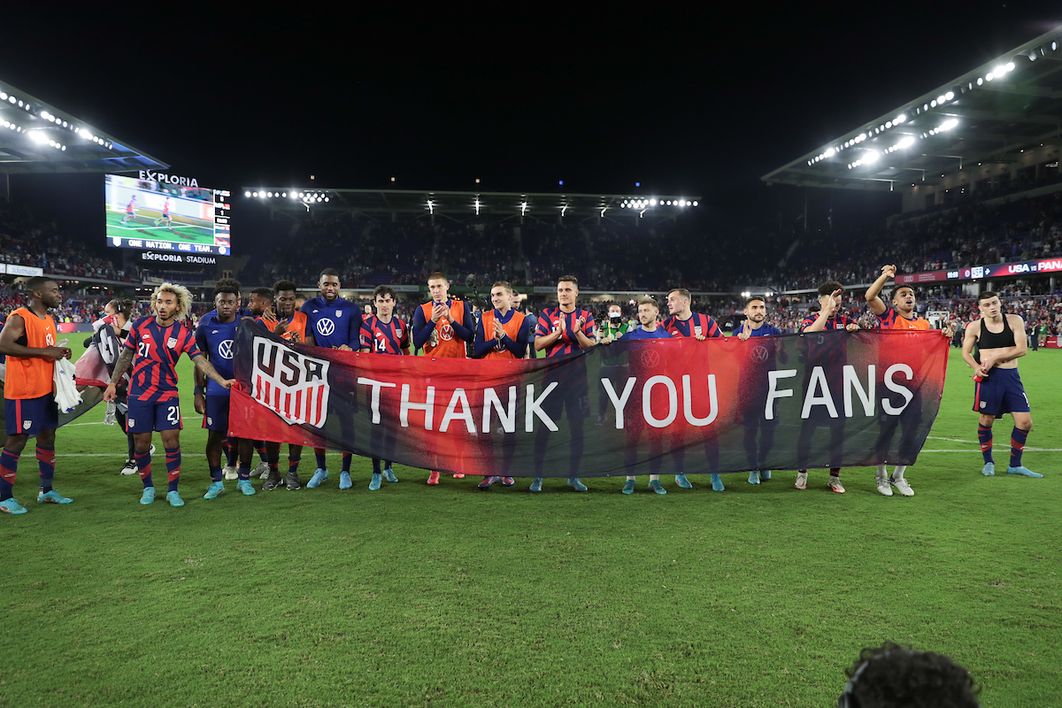
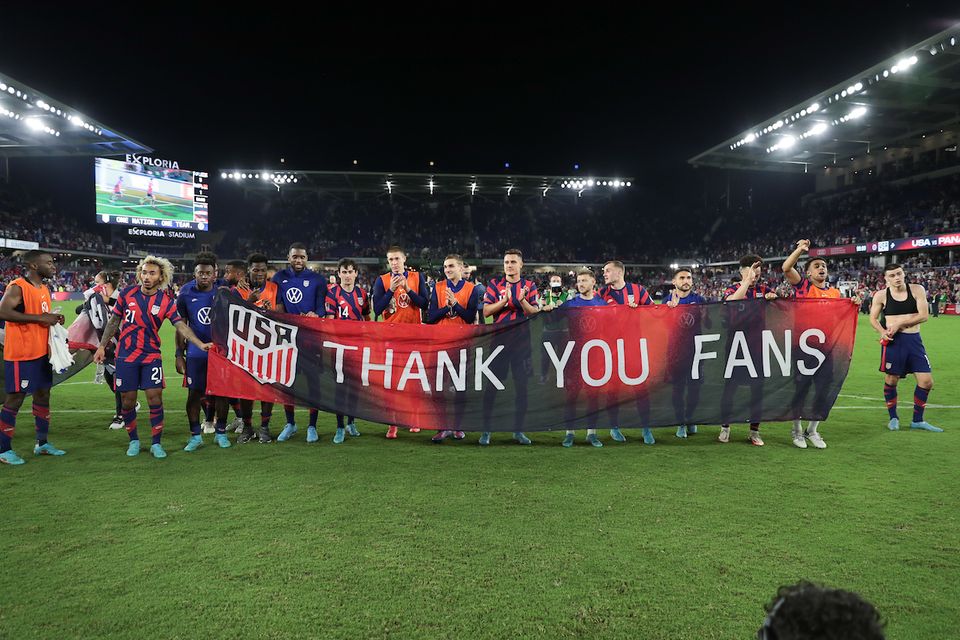
Stewart and McBride said it would be difficult to take exact specific situations from 2002 because the game has changed and much so much faster. But general experiences can go a long way in building a team culture.
"Through all the experiences that we had in 2002, but also 94, and others in 2006, you think about the ways that you can help teams and then implement that within what we're doing right now," Stewart said. "We're trying to take best practices that we know about and help the team to prepare. Generations change, times change. I'm not really sure like that you dwell on the past."
McBride agreed and elaborated.
"I'm not big on reminiscing or having teams reminisce because I think everybody has to have their own path," he said.
"That said, the decisions I make are based on my understanding of past experiences and understanding of the group, national teams or the Men's National Team,” he said. “Creating a culture is something that's important. A feeling of certainty, of understanding, of belief. You have respect. Those are the things that you can take away from past teams. When you have it, you can see positive things and positive results."
